further reading
The selection of sources suggested by this text is impressively wide and good.
further reading
The selection of sources suggested by this text is impressively wide and good.
n July reasoning models from both OpenAI and Google Gemini achieved gold medal performance in the International Math Olympiad, a prestigious mathematical competition held annually (bar 1980) since 1959. This was notable because the IMO poses challenges that are designed specifically for that competition. There’s no chance any of these were already in the training data! It’s also notable because neither of the models had access to tools—their solutions were generated purely from their internal knowledge and token-based reasoning capabilities.
international math olympiad style questions can be answered by OpenAI and Gemini models without tools nor having the challenges in their training data.
It turned out that the real unlock of reasoning was in driving tools. Reasoning models with access to tools can plan out multi-step tasks, execute on them and continue to reason about the results such that they can update their plans to better achieve the desired goal. A notable result is that AI assisted search actually works now. Hooking up search engines to LLMs had questionable results before, but now I find even my more complex research questions can often be answered by GPT-5 Thinking in ChatGPT. Reasoning models are also exceptional at producing and debugging code. The reasoning trick means they can start with an error and step through many different layers of the codebase to find the root cause. I’ve found even the gnarliest of bugs can be diagnosed by a good reasoner with the ability to read and execute code against even large and complex codebases.
Reasoning models are useful for: running tools (mcp) search now works debugging/writing code
Your comment inspires me to pay more attention to citing and clarifying my claims.
replying to Will at https://forum.zettelkasten.de/discussion/comment/18885/#Comment_18885
I've generally found that this is much easier to do when it's an area you tend to specialize in and want to delve ever deeper (or on which you have larger areas within your zettelkasten) versus those subjects which you care less about or don't tend to have as much patience for.
Perhaps it's related to the System 1/System 2 thinking of Kahneman/Tversky? There are only some things that seem worth System 2 thinking/clarifying/citing and for all the rest one relies on System 1 heuristics. I find that the general ease of use of my zettelkasten (with lots of practice) allows me to do a lot more System 2 thinking than I had previously done, even for areas which I don't care as much about.
syndication link: https://forum.zettelkasten.de/discussion/comment/18888/#Comment_18888
analogical reasoning
for: definition, definition - analogical reasoning
definition: analogical reasoning
Federal control of the intrastate private possession and breeding of prohibited wildlife species is essential to the effective control of the interstate incidents of traffic in prohibited wildlife species.
Argument: Federal control of intrastate possession of prohibited wildlife species (i.e., big cats) cannot be effective without control of interstate incidents of traffic of these species
Private possession and breeding of prohibited wildlife species have a substantial and direct effect on interstate commerce because prohibited wildlife species are frequently bred and possessed to be used in public exhibition or for sale or transfer of ownership in the exotic pet trade, and are often transported in interstate commerce for these purposes.
How private possession and breeding impacts interstate commerce and the public
The private possession, breeding, and sale of prohibited wildlife species has a substantial and detrimental effect on the health and general welfare of the people of the United States and on the conservation of the species themselves.
This reasoning can be extrapolated to extend to a Small Cat Public Safety Act
The distinction between a priori and a posteriori knowledge thus broadly corresponds to the distinction between empirical and nonempirical knowledge.
The terms “a priori” and “a posteriori” are used primarily to denote the foundations upon which a proposition is known. A given proposition is knowable a priori if it can be known independent of any experience other than the experience of learning the language in which the proposition is expressed, whereas a proposition that is knowable a posteriori is known on the basis of experience.
framework for making claims with evidence. The simplest of which, which is what I use, is Claim-Evidence-Reasoning (CER). Students are taught to state their claim (The theme of the story is X), support it with evidence (Readers can infer this through the story's plot, particularly...), and explain their reasoning (Because the character's action result in X, ...) Another great framework is The Writing Revolution/The Hochman Method's "single paragraph outline". Students need to be taught that these are the units of thought -- the most basic forms of an argument. And, even before this, they need to know that a sentence is the form of an idea.
Clearly this type of reasoning has an argumentation scheme. One premisedefines or describes a goal. The other premise describes a means of achieving thegoal. The conclusion directs the agent towards action to carry out the means.6But this type of reasoning is so common and distinctive, having manyvariants and subspecies of argumentation, that it is misleading to call it anargumentation scheme. Better to call it a type of reasoning that can be used inargumentation in different types of dialogue (as in Walton, What Reas., 1990).
A person who puts forward an argumentation anticipates criticism, and bychoosing a particular type of argumentation, using the one argumentationscheme rather than the other, he implies that he thinks he knows which routewill lead to the justification of his standpoint. At any rate, whether he reallythinks this or not, if he is to be taken seriously by the other party, he may beheld to be committed to deal with the critical questions which pertain to ajustification via the argumentation scheme that is inherent in his argumentation.In relying on a certain argumentation scheme, the arguer invokes a particular testing method in a dialectical procedure, in which certain criticalreactions are relevant, and others not. Each argumentation scheme calls, as itwere, for its own set of critical reactions. In conjunction with each other,these reactions constitute a well-rounded test for checking the soundness of anargumentation of the type concerned. (p. 98)This way of describing argumentation schemes suggests that they are normativelybinding, in the following sense. If the hearer accepts the premises of the speaker'sargument, and the argument is an instance of a genuine and appropriate argumentation scheme (for the type of dialogue they are engaged in), then the hearer mustor should (in some binding way) accept the conclusion. This does not appear to be"validity" in the same sense in which the word is familiarly used in deductive (orperhaps even inductive) logic. But it does appear to express a normative or broadlylogical sense of validity, bindingness, conditional acceptability, or whatever youwant to call it
Instead, we hope to show, theseargumentation schemes can best be revealed as normatively binding kinds ofreasoning when seen as moves, or speech acts in the setting of dialogue. In thispragmatic framework, two participants are reasoning together in a goal-directed,interactive, conventionalized framework called a dialogue. An argument is evaluated as good (correct, reasonable) to the extent that it contributes to the goal of thedialogue. An argument is evaluated as bad (incorrect, fallacious) to the extent thatit blocks the goals of the dialogue.
It is necessary that the student be alert to reason as the speakerreasons. It is very dangerous to jot down the results of reasoning if youhave not followed it in your own mind.
Dramatically important in mathematics, but also in every other area.
**Use Page Notes to add annotation guidance.
INSTRUCTIONS - Make 5 new annotations using the prompts below and respond to 3 others. Use text, hashtags, emojis, and G-rated language. Be respectful always.
PROMPTS - Annotate the text for each of the following: 1. Main claim, and why you think so. 2. Evidence that supports the claim and what additional information would make the evidence stronger. 3. Reasoning that connects the evidence to the claim (or if it's missing). 4. Something new or surprising you learned from this paper. 5. What could be the researchers' next experiment?
I have deep doubts about the intellectual and social value of schooling.
I don't believe any deductive reasoning was used.
Even here, though, schools’ performance is mediocre and unlikely to meaningfully improve. Schools have been trying to overcome reading, writing and math deficits among underperforming students for decades.
I think the argument would improve greatly if statistics were included here. Statistics to prove school performance is mediocre would improve the argument greatly since that is a premise of the argument.
I have deep doubts about the intellectual and social value of schooling.
I don't believe the author uses analogical reasoning in this argument and cannot think of a particular way this certain argument would benefit from it.
My work focuses on tests of adult knowledge — what adults retain after graduation. The general pattern is that grown-ups have shockingly little academic knowledge. College graduates know about what you’d expect high school graduates to know; high school graduates know about what you’d expect dropouts to know; dropouts know next to nothing
Week 11- In this paragraph the author mentions that their work consists of collecting data and makes a claim based off that data but does not provide the readers with it. I believe that the argument would be much stronger if supporting data was shown.
“Madness, say you? Are you sure? Were not these sights, and these sounds, really seen and heard?” My uncle was surprized at my question. He looked at me with apparent inquietude. “Can you doubt,” said he, “that these were illusions? Does heaven, think you, interfere for such ends?” “O no; I think it not. Heaven cannot stimulate to such unheard-of outrage. The agent was not good, but evil.” “Nay, my dear girl,” said my friend, “lay aside these fancies. Neither angel nor devil had any part in this affair.” “You misunderstand me,” I answered; “I believe the agency to be external and real, but not supernatural.” “Indeed!” said he, in an accent of surprize. “Whom do you then suppose to be the agent?”
This is a great contrast to Wieland's confession. Neither of them think the cause was of supernatural origin, - no cosmologycal drama was involved - but either Wieland became insane or there was a setup by a 3rd party, presumably Carwin.
Corner, A., Hahn, U., & Oaksford, M. (2011). The psychological mechanism of the slippery slope argument. Journal of Memory and Language, 64(2), 133–152. https://doi.org/10.1016/j.jml.2010.10.002
Desai, S. C., & Reimers, S. (2022). Does explaining the origins of misinformation improve the effectiveness of a given correction? PsyArXiv. https://doi.org/10.31234/osf.io/fxkzc
Summarization of Methods for DeFi Optimization
squashed resource table of methods for DeFi Optimization.
Though man began to lose its central place as subject of philosophy immediately after Socratic period with the glorification of reason by Plato and Aristotle, but Renaissance and Enlightenment intensified its severity and put last nail in the coffin
Since one cannot prove that it is inaccurate, you cannot discount its possibility.
False. Per Hitchens's Razor, "what can be asserted without evidence can also be dismissed without evidence."
Put simply, the responsibility for proving a claim rests with those making the claim. One may safely discount the possibility of anything that cannot be proven.
See also "Russel's Teapot".
Reformers, or people who defend current police systems, tend to talk as if most police work is beneficial. Officers in this view are friendly, as in the police fictionalized in the comedy “Brooklyn Nine-Nine,” or are at least engaged in vital work, as portrayed dramatically in “Law & Order.” But Kaba doesn’t get her view of policing from television. She gets it from talking to Black people and people of color — especially youth, queer people and sex workers — who deal with the police every day.
Although this isn't used as an analogy, it points out the analogy people have with their viewpoints on police. For some, they see these characters on television which ended up persuading their viewpoint on what police are really like.
Her opposition to police and prison starts with the experiences of marginalized people, who have to deal with police and carceral violence every day.
Although I know this from a first hand experience and experience of family members, I think statistics on incarcerated people would benefit the article.
If someone who has never researched this topic reads this, they wouldn't truly understand the gap between marginalized people incarcerated and those not.
Another good statistic that could be used is the recent amount of people that have been released early or with certain crimes being decrimalized and what groups those are.
Black people, 32 percent of the population in Chicago, account for 72 percent of police stops, according to ACLU of Illinois data.
I believe this is a great use of statistics in an argument like this. It instantly responds to the statement said before and shows how even though black people take up such a small percent of Chicago, they are the most stopped.
Michael Bang Petersen. (2021, March 17). This is worsened as costs of #covid19 are not mentally similar to costs of side effects, even if the latter are less risky. People prefer controllable risks to uncontrollabe risks, even if less lethal (https://t.co/kSIcObWYmT). That is why you fear flying but not driving. [2/2] [Tweet]. @M_B_Petersen. https://twitter.com/M_B_Petersen/status/1372103708218159109
Stefan Simanowitz. (2021, March 18). 1/. The PM claims that the govt “stuck to the science like glue” But this is not true At crucial times they ignored the science or concocted pseudo-scientific justifications for their actions & inaction This thread, & the embedded threads, set them out https://t.co/dhXqkSL1bz [Tweet]. @StefSimanowitz. https://twitter.com/StefSimanowitz/status/1372460227619135493
ReconfigBehSci. (2022, March 12). @rwjdingwall @mugecevik @RobFreudenthal 2/2 it’s like comparing how wet you got in a down pour with and without umbrella... The biggest surprise to me in this pandemic hasn’t been the “overreaction” it’s been the constant failure with respect to basic counter-factual reasoning [Tweet]. @SciBeh. https://twitter.com/SciBeh/status/1502681510436130831
t can’t be possible, because the texts were from his agent. A senior-aged Asexual woman, and I quote:“so it’s far-from-romantic.”Talk to any Asexual person, and they would be offended at the implication that Asexuals aren’t romantic or don’t date. It’s actually more-in-line with Aphobic rhetoric that Asexuality is born from somebodies lack of ability to form relationships due to looks or personality.
This is a case of false generalization.
ReconfigBehSci. (2022, March 12). @rwjdingwall @mugecevik @RobFreudenthal it makes little sense to numerically compare this pandemic with all of the intervention that occurred directly with past ones where medicine and epidemiology where of a completely different standard to conclude that this one ‘wasn’t bad’. 1/2 [Tweet]. @SciBeh. https://twitter.com/SciBeh/status/1502681086819721223
Greenland’s Melting Ice Is No Cause for Climate-Change Panic
Overall scientific credibility: 'very low' according to the scientists who analyzed this article.
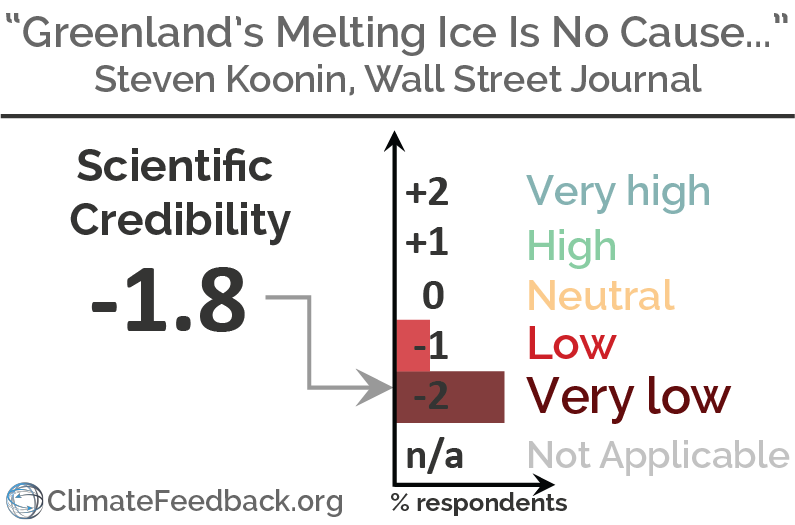
Find more details in Climate Feedback's analysis
After all, the academic disciplines, as they have come down to us, represent an implicit taxonomy that favors analytical reasoning and discursive practices.
And no child in highschool regardless should be able to do that either because of dresscode, horny hormone infused teenage boys, and you never know if some of the teacher are attracted to children.
The writer of this argument does not use a specific type of evidence (first-hand, second-hand, and quantitative). The writer does not use facts proven by trustworthy authority, personal experience that would be reasoning for the writers opinion, or data that can be measured, but rather simply stating their opinion as evidence.
US, G. S., Barbara K. Hofer,The Conversation. (n.d.). Don’t Look Up Illustrates 5 Myths That Fuel Rejection of Science. Scientific American. Retrieved January 14, 2022, from https://www.scientificamerican.com/article/dont-look-up-illustrates-5-myths-that-fuel-rejection-of-science/
Dismayingly, Spielberg didn’t have the courage or the insight to imagine it.
Throughout the whole article, Brody has been stating that Spielberg was not creative enough. By stating this as the last sentence he is leaving his readers with one last opinion from him that tries to prove his point.
Spielberg didn’t open up the story to involve new ideas and experiences, nor did he reckon with the cultural and political forces that gave rise to “West Side Story” in the first place.
He is stating his claim again to make a point and leave his audience with this bit of information and opinion left in their heads.
Priniski, J. H. (2021). A Darkening Spring: How Preexisting Distrust Shaped COVID-19 Skepticism. PsyArXiv. https://doi.org/10.31234/osf.io/49y6s
Sloman, S. A. (2021). How Do We Believe? Topics in Cognitive Science, 0(2021), 1–14. https://doi.org/10.1111/tops.12580
how many of those metaphors are there in your brain tens of thousands and then we're going to point out in a little while that they have 00:20:06 elementary metaphors that that make them up there are actually smaller metaphors that fit together
Metaphors and analogical reasoning plays a major role in language use.
Notice that in the else branch, we don’t need to do anything special - if x wasn’t a string[], then it must have been a string.
designing
having students learn by designing their own games combines design thinking and game-based learning
Manoochehri, M., Šrol, J., Asl, F. A., Mehdinasab, M., & Akhoundi, Z. (2021). Association of Mental Fatigue due to Long-term Restrictive Measures with Reasoning: A COVID-19 Study. PsyArXiv. https://doi.org/10.31234/osf.io/4yme9
ReconfigBehSci. (2021, October 30). as the fallout from the JCVI minutes build, it’s worth considering that the corresponding U.S. body ACIP has been live streaming its meetings on YouTube... Transparency helps reduce faulty reasoning...we should have learned that lesson with the very first lockdown, no? [Tweet]. @SciBeh. https://twitter.com/SciBeh/status/1454502337368764421
Kara-Yakoubian, M., Meyers, E. A., Sharpinskyi, K., Dorfman, A., & Grossmann, I. (2021). Hidden wisdom or pseudo-profound bullshit? The effect of speaker admirability. PsyArXiv. https://doi.org/10.31234/osf.io/tpnkw
Lagnado, D. A. (2022). Explaining the evidence: How the mind investigates the world. Cambridge University Press.
Puryear, C., & Gray, K. (2021). Using “Balanced Pragmatism” in Political Discussions Increases Cross-Partisan Respect. PsyArXiv. https://doi.org/10.31234/osf.io/yhpdt
Tappin, B. M. (2021). Exposure to Arguments and Evidence Changes Partisan Attitudes Even in the Face of Countervailing Leader Cues. PsyArXiv. https://doi.org/10.31234/osf.io/247bs
Basol, M., Roozenbeek, J., & van der Linden, S. (n.d.). Good News about Bad News: Gamified Inoculation Boosts Confidence and Cognitive Immunity Against Fake News. Journal of Cognition, 3(1), 2. https://doi.org/10.5334/joc.91
Motz, B., Fyfe, E., & Guba, T. P. (2021). Learning to Call Bullsh*t via Induction: Categorization Training Improves Critical Thinking Performance. PsyArXiv. https://doi.org/10.31234/osf.io/65qfj
One last resource for augmenting our minds can be found in other people’s minds. We are fundamentally social creatures, oriented toward thinking with others. Problems arise when we do our thinking alone — for example, the well-documented phenomenon of confirmation bias, which leads us to preferentially attend to information that supports the beliefs we already hold. According to the argumentative theory of reasoning, advanced by the cognitive scientists Hugo Mercier and Dan Sperber, this bias is accentuated when we reason in solitude. Humans’ evolved faculty for reasoning is not aimed at arriving at objective truth, Mercier and Sperber point out; it is aimed at defending our arguments and scrutinizing others’. It makes sense, they write, “for a cognitive mechanism aimed at justifying oneself and convincing others to be biased and lazy. The failures of the solitary reasoner follow from the use of reason in an ‘abnormal’ context’” — that is, a nonsocial one. Vigorous debates, engaged with an open mind, are the solution. “When people who disagree but have a common interest in finding the truth or the solution to a problem exchange arguments with each other, the best idea tends to win,” they write, citing evidence from studies of students, forecasters and jury members.
Thinking in solitary can increase one's susceptibility to confirmation bias. Thinking in groups can mitigate this.
How might keeping one's notes in public potentially help fight against these cognitive biases?
Is having a "conversation in the margins" with an author using annotation tools like Hypothes.is a way to help mitigate this sort of cognitive bias?
At the far end of the spectrum how do we prevent this social thinking from becoming groupthink, or the practice of thinking or making decisions as a group in a way that discourages creativity or individual responsibility?
Vaccine inventor questions mandatory shot push, Biden’s Covid-19 strategy
Overall scientific credibility: 'low', according to scientists who analyzed this article.
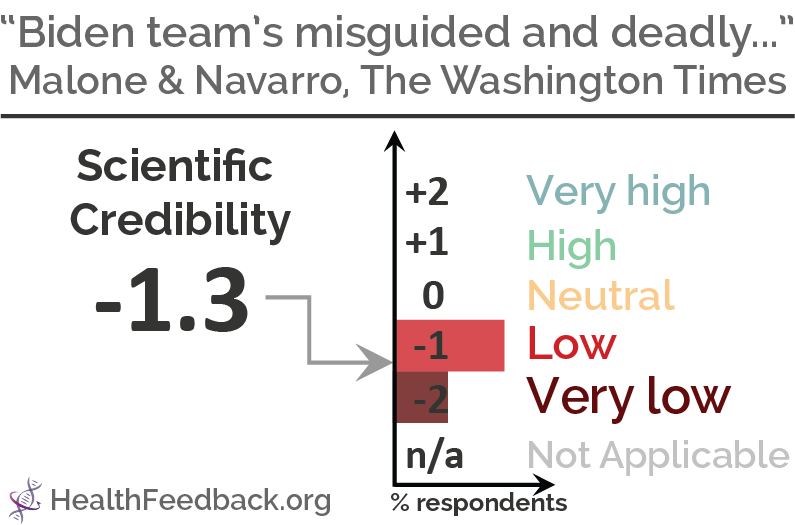
Find more details in Health Feedback's analysis
Aarts, A. A. (2021). Psychological Science replicates just fine, thanks. PsyArXiv. https://doi.org/10.31234/osf.io/h4byg
Gugerty, L., Shreeves, M., & Dumessa, N. (2021). Biased belief updating in causal reasoning about COVID-19. PsyArXiv. https://doi.org/10.31234/osf.io/bfw76
Leblanc-Sirois, Y., Gagnon, M.-È., & Blanchette, I. (2020). Emotions, reasoning, and mental health as predictors of behavior during three phases of the COVID-19 pandemic. PsyArXiv. https://doi.org/10.31234/osf.io/2p39h
There is no climate emergency
Overall scientific credibility: 'very low' according to the scientists who analyzed this article.
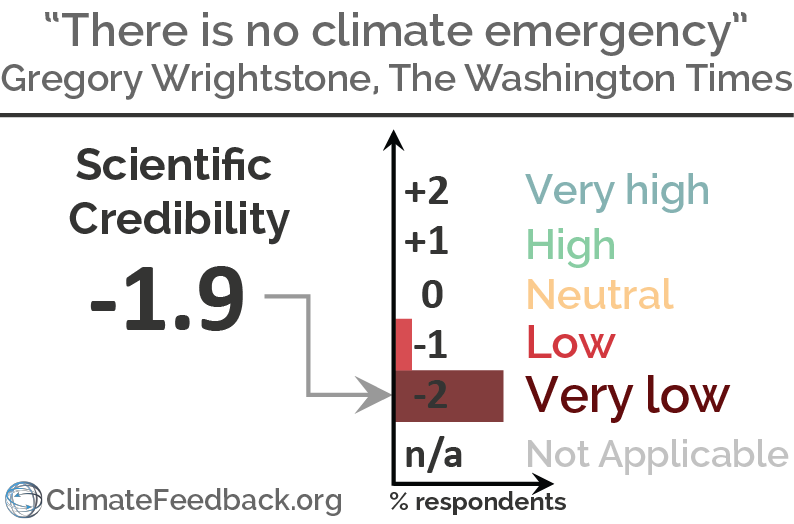
Find more details in Climate Feedback's analysis
Jacobson, R. M., Targonski, P. V., & Poland, G. A. (2007). A taxonomy of reasoning flaws in the anti-vaccine movement. Vaccine, 25(16), 3146–3152. https://doi.org/10.1016/j.vaccine.2007.01.046
Are We Doomed?
Overall scientific credibility: 'very low' according to the scientists who analyzed this article.
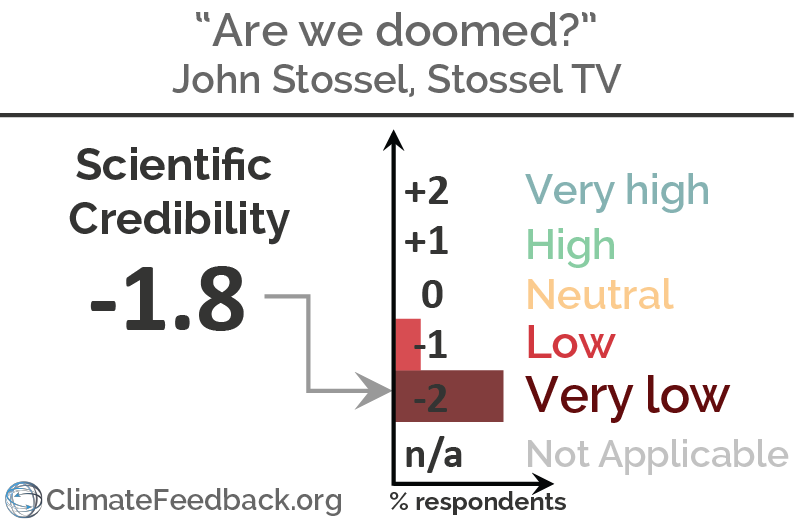
Find more details in Climate Feedback's analysis
Elsey, James, and Merel Kindt. ‘Knowing When to Trust Your Gut: The Perceived Trustworthiness of Fear Varies with Domain Expertise’. PsyArXiv, 16 April 2021. https://doi.org/10.31234/osf.io/682su.
West, J. D., & Bergstrom, C. T. (2021). Misinformation in and about science. Proceedings of the National Academy of Sciences, 118(15). https://doi.org/10.1073/pnas.1912444117
Nick Barrowman. (2021, March 26). Throughout the pandemic, a widespread inability to reason counterfactually has been on display. For example, some people apparently think lockdowns don’t work. They seem unable to imagine the situation had there not been a lockdown. Lockdowns are costly, but they work! [Tweet]. @nbarrowman. https://twitter.com/nbarrowman/status/1375240312264740870
Levy, N. L., & Ross, R. M. (2020). The cognitive science of fake news [Preprint]. PsyArXiv. https://doi.org/10.31234/osf.io/3nuzj
Earth's climate is 'cyclical' as new study claims an ice age is coming
Overall scientific credibility: 'very low' according to the scientists who analyzed this article.
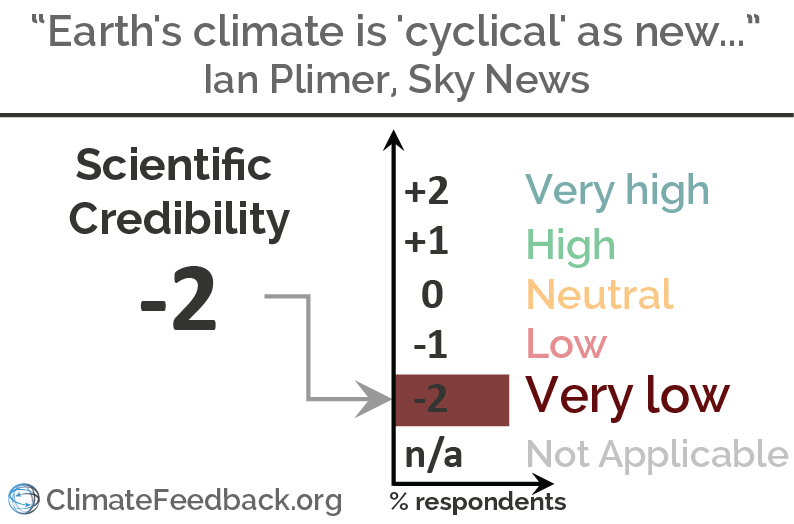
Find more details in Climate Feedback's analysis
Pennycook, G., & Rand, D. (2020). The Cognitive Science of Fake News. PsyArXiv. https://doi.org/10.31234/osf.io/ar96c
A lot of Democrats believe in what is called Enlightenment reasoning, and that if you just tell people the facts, they’ll reach the right conclusion. That just isn’t true.
Antoniou, Rea, Heather Romero-Kornblum, J. Clayton Young, Michelle You, Joel Kramer, and Winston Chiong. ‘No Utilitarians in a Pandemic? Shifts in Moral Reasoning during the COVID-19 Global Health Crisis’, 21 September 2020. https://doi.org/10.31234/osf.io/yjn3u.
CSM_seminar Causal Inference Isn't What You Think It Is. (2020). Retrieved 24 August 2020, from https://panopto.lshtm.ac.uk/Panopto/Pages/Viewer.aspx?id=ac88b49f-7e63-458d-823e-abe50152fb66
Ecker, Ullrich, Brandon Sze, and Matthew Andreotta. ‘No Effect of Partisan Worldview on Corrections of Political Misinformation’, 20 August 2020. https://doi.org/10.31234/osf.io/bszm4.
Why antibodies may not be the key to beating coronavirus
Overall scientific credibility: 'very high', according to scientists who analyzed this article.
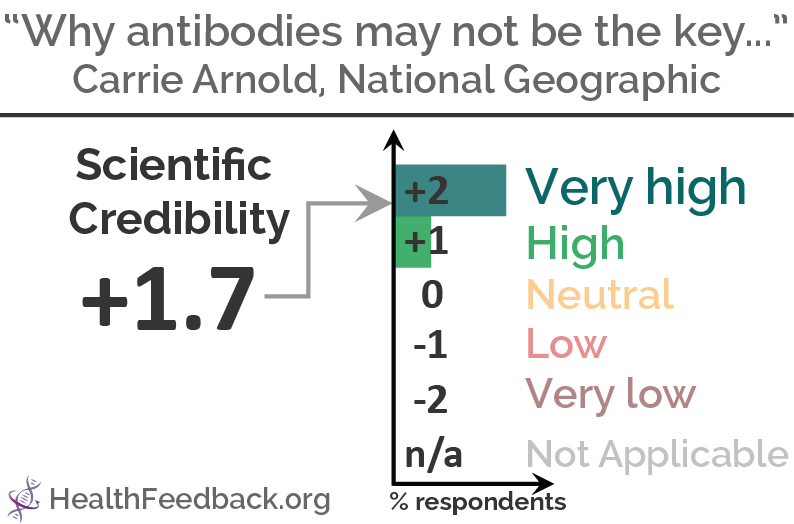
Find more details in Health Feedback's analysis
van Baal, S. T., & Hohwy, J. (2020). Risk perception and personal responsibility during COVID-19: An experimental study of the role of imperative vs reasoning-based communication for self-isolation attitudes [Preprint]. PsyArXiv. https://doi.org/10.31234/osf.io/s7jeq
Causal inference isn’t what you think it is. (n.d.). LSHTM. Retrieved June 26, 2020, from https://www.lshtm.ac.uk/newsevents/events/causal-inference-isnt-what-you-think-it
Kozyreva, A., Lewandowsky, S., & Hertwig, R. (2019, December 4). Citizens Versus the Internet: Confronting Digital Challenges With Cognitive Tools. https://doi.org/10.31234/osf.io/ky4x8
Ekstrom, P. D., & Lai, C. K. (2020, June 18). The Selective Communication of Political Information. https://doi.org/10.31234/osf.io/pnr9u
Thibodeau, P. H., & Boroditsky, L. (2013). Natural Language Metaphors Covertly Influence Reasoning. PLOS ONE, 8(1), e52961. https://doi.org/10.1371/journal.pone.0052961
Dahl, Audun. ‘Young Children’s Judgments and Reasoning about Prosocial Acts’. Preprint. PsyArXiv, 28 May 2020. https://doi.org/10.31234/osf.io/gf593.
Grossmann, I., Weststrate, N. M., Ardelt, M., Brienza, J. P., Dong, M., Ferrari, M., Fournier, M. A., Hu, C. S., Nusbaum, H., & Vervaeke, J. (2020). The Science of Wisdom in a Polarized World: Knowns and Unknowns [Preprint]. PsyArXiv. https://doi.org/10.31234/osf.io/w9ygc
Lagnado, D. (2020 April 27). What if.... Changing Minds. https://www.youtube.com/watch?v=2W11CRLjRgo&app=desktop
Johnson, S. G. B., Bilovich, A., & Tuckett, D. (2020, April 30). Conviction Narrative Theory: A Theory of Choice Under Radical Uncertainty. Retrieved from psyarxiv.com/urc96
Cavojova, V., Šrol, J., & Mikušková, E. B. (2020, April 15). Scientific reasoning as a predictor of health-related beliefs and behaviors in the time of COVID-19. https://doi.org/10.31234/osf.io/tfy5q
Rosenfeld, D. L., Rothgerber, H., & Wilson, T. (2020, April 22). Politicizing the COVID-19 Pandemic: Ideological Differences in Adherence to Social Distancing. https://doi.org/10.31234/osf.io/k23cv
Thibodeau, P. H., Hendricks, R. K., & Boroditsky, L. (2017). How Linguistic Metaphor Scaffolds Reasoning. Trends in Cognitive Sciences, 21(11), 852–863. https://doi.org/10.1016/j.tics.2017.07.001
Don’t buy China’s story: The coronavirus may have leaked from a lab
Overall scientific credibility: 'very low', according to scientists who analyzed this article.
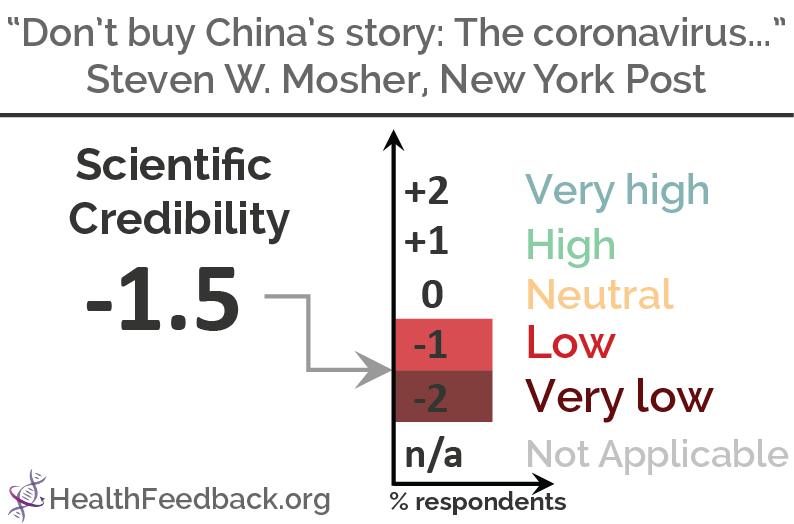
Find more details in Health Feedback's analysis
See how global warming has changed the world since your childhood
Overall scientific credibility: 'very high' according to the scientists who analyzed this article.
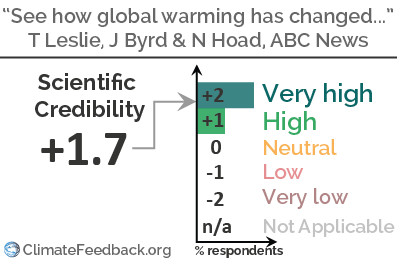
Find more details in Climate Feedback's analysis
More Polio Cases Now Caused by Vaccine Than by Wild Virus
Overall scientific credibility: 'high', according to scientists who analyzed this article.
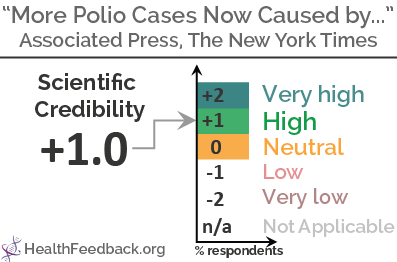
Find more details in Health Feedback's analysis
Let’s not pollute minds with carbon fears
Overall scientific credibility: 'very low' according to the scientists who analyzed this article.
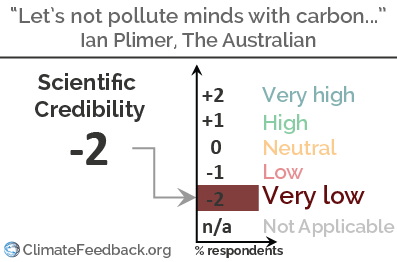
Find more details in Climate Feedback's analysis
Climate change: fake news or global threat? This is the science RUM.mark( 'content_load_fmp' ); Save
Overall scientific credibility: 'very low' according to the scientists who analyzed this article.
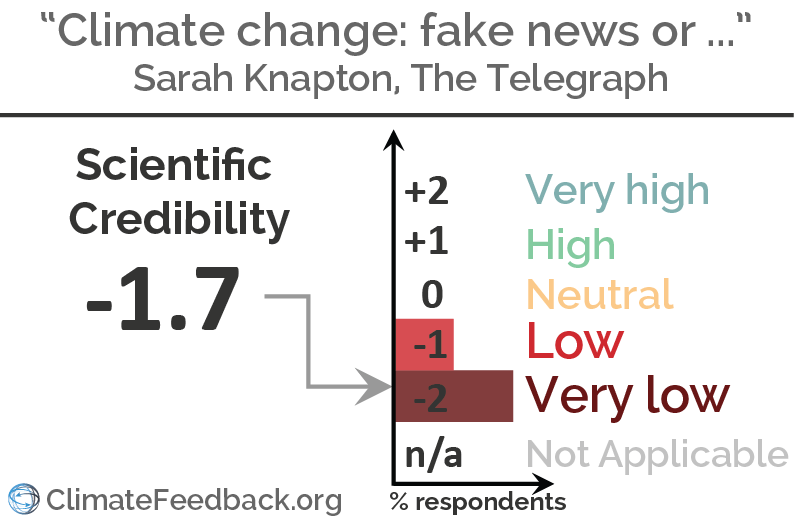
Find more details in Climate Feedback's analysis
The great failure of the climate models
Overall scientific credibility: 'very low' according to the scientists who analyzed this article.
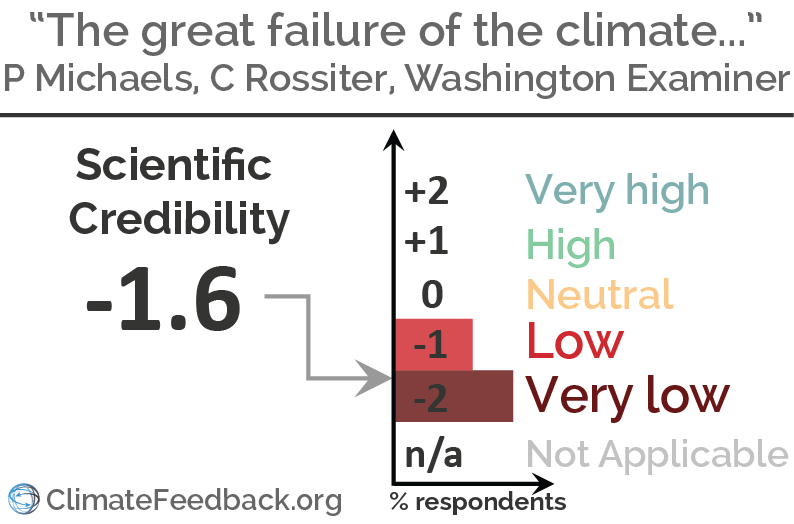
Find more details in Climate Feedback's analysis
Ross McKitrick: This scientist proved climate change isn’t causing extreme weather — so politicians attacked
Overall scientific credibility: 'low' according to the scientists who analyzed this article.
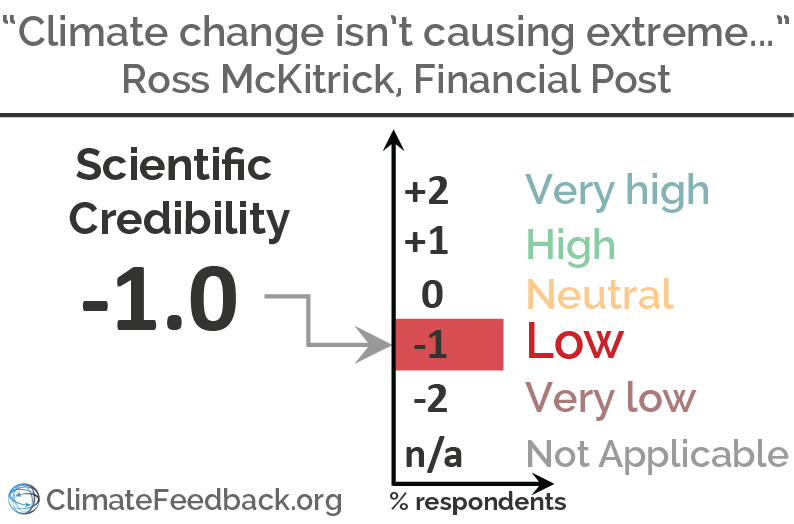
Find more details in Climate Feedback's analysis
The truth of climate change is revealed at school
Overall scientific credibility: 'very low' according to the scientists who analyzed this article.
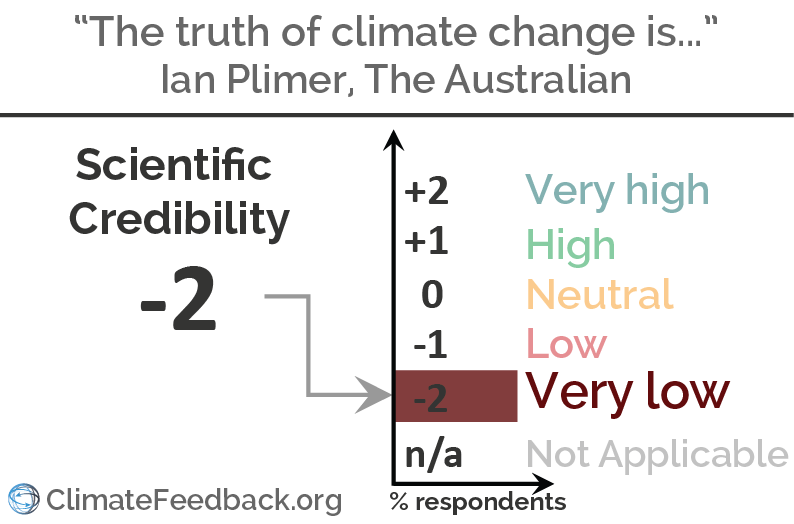
Find more details in Climate Feedback's analysis
Scientists Prove Man-Made Global Warming Is a Hoax
Overall scientific credibility: 'very low' according to the scientists who analyzed this article.
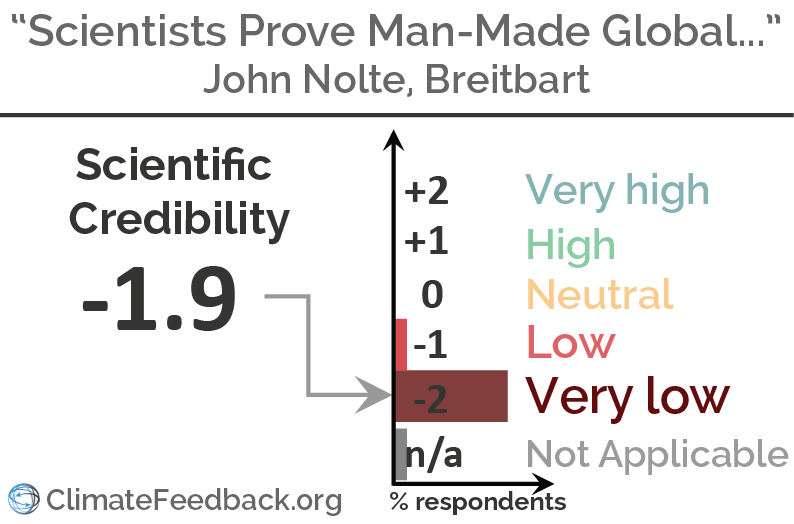
Find more details in Climate Feedback's analysis
Media Hysteria: Climate Change ‘Heat Records’ Are a Huge Data Manipulation
Overall scientific credibility: 'very low' according to the scientists who analyzed this article.
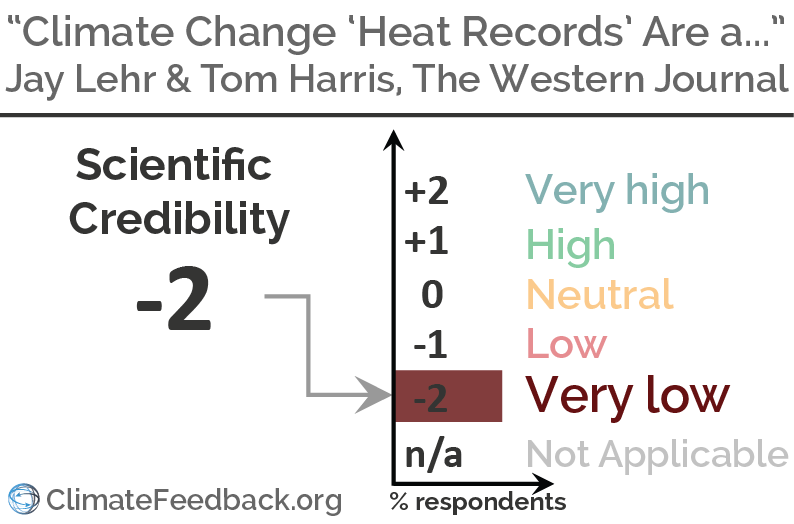
Find more details in Climate Feedback's analysis
In 2016, the top seven advanced to the grand championship finale, where they’d need to enter a full cyber-reasoning system—one that would not merely notice a problem but could also infer its nature.
Huge reduction in meat-eating ‘essential’ to avoid climate breakdown
Overall scientific credibility: 'high', according to scientists who analyzed this article.
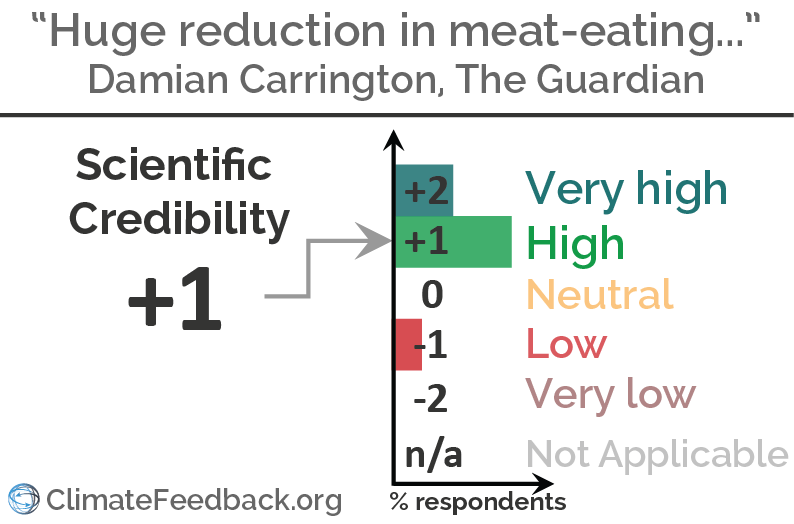
Find more details in Climate Feedback's analysis
North Pole surges above freezing in the dead of winter, stunning scientists
Overall scientific credibility: 'very high', according to scientists who analyzed this article.
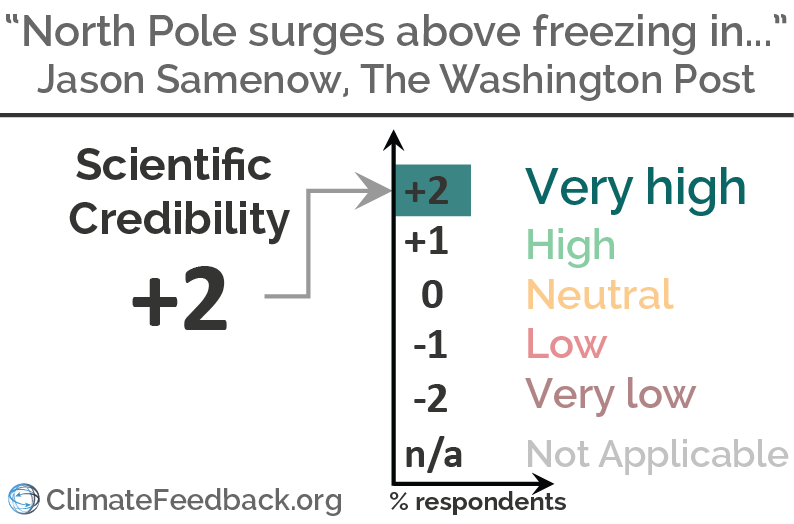
Find more details in Climate Feedback's analysis
Climate Science and the Myths of Renewable Energy
Overall scientific credibility: 'high', according to scientists who analyzed this article.
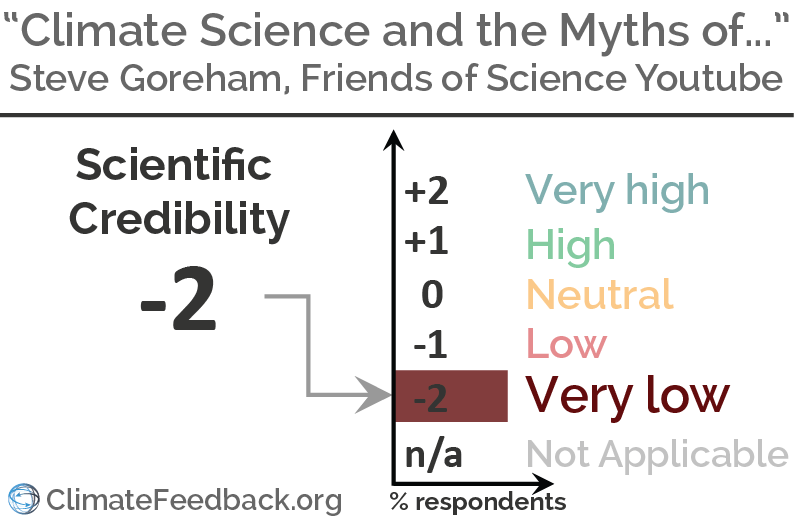
Find more details in Climate Feedback's analysis
World Health Organization Officially Declares Bacon is as Harmful as Cigarettes
Overall scientific credibility: 'low' to 'very low', according to scientists who analyzed this article.
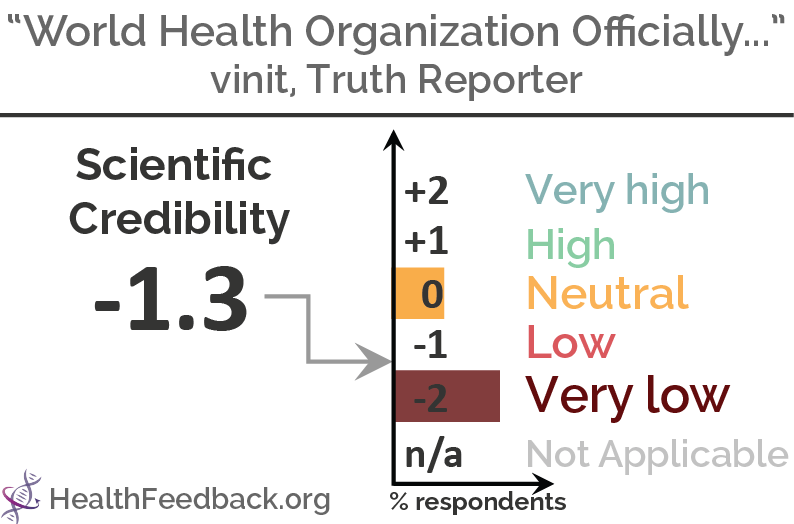
Find more details in Health Feedback's analysis
Here's How to Tell if You Have a Cold or the Flu
Overall scientific credibility: 'high' to 'very high', according to scientists who analyzed this article.
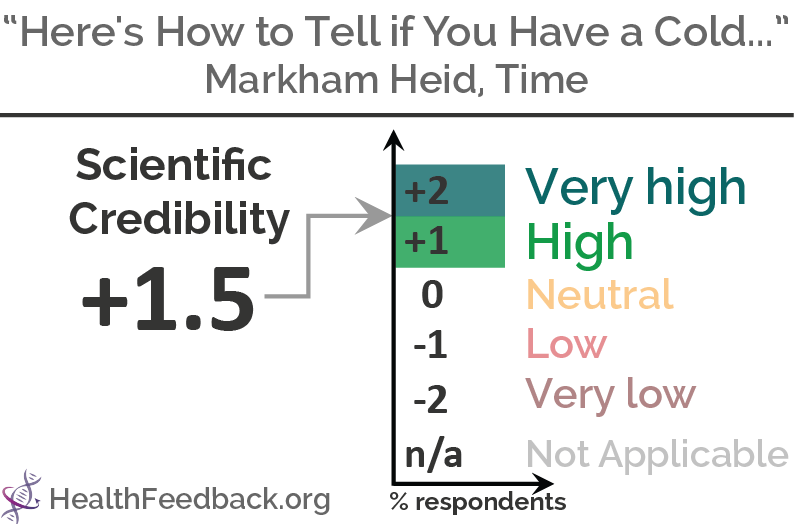
Find more details in Health Feedback's analysis
Startling new research finds large buildup of heat in the oceans, suggesting a faster rate of global warming
Overall scientific credibility: 'high', according to scientists who analyzed this article.
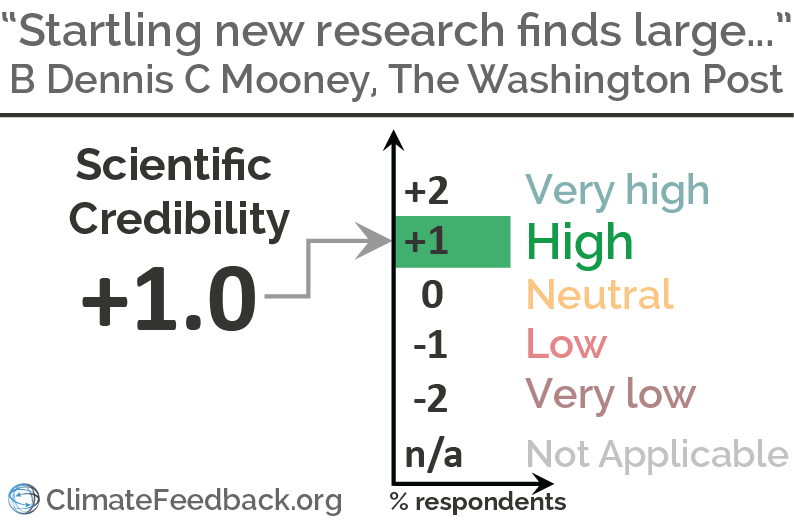
Find more details in the annotations below and in Climate Feedback's analysis
As the power is unleashed, computers on the Semantic Web achieve at first the ability to describe, then to infer, and then to reason. The schema is a huge step, and one that will enable a vast amount of interoperability and extra functionality. However, it still only categorizes data. It says nothing about meaning or understanding.
The author presents an interesting progression for the Web to eventually learn to reason. The picture he paints of more accessible content on the internet hinges on the internet learning to reason, which is a human characteristic. It seems we need to apply human characteristics to all of our mechanics for them to progress in their usefulness.
Hurricane Florence is not climate change or global warming. It's just the weather.
Overall scientific credibility: 'low' to 'very low', according to scientists who analyzed this article.
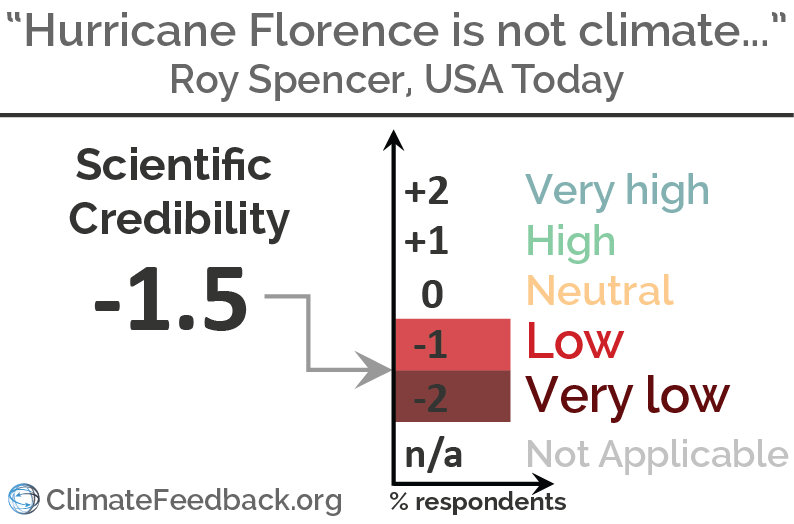
Find more details in the annotations below and in Climate Feedback's analysis
In contrast, activities of invention almost always progress towards the creation of new or better things but not necessarily through refi nement. Normally we invent by combining a set of things we already understand how to create into larger, more complex, or more capable things that did not previously exist.
The purpose of HCI as invention:
• "understanding can sometimes decrease" due to complexity of making things
• "things are more capable"
Activities of discovery can have a variety of aims, including generating rich, empirically based descriptions, and creating new theoretical understandings
The purpose of HCI as discovery:
•"form framing truths"
• elaborate to "progress toward improved understandings"
• refined to "explain more phenomena or to be more predictive"
• "developing and testing competing ideas"
Another way of understanding technical HCI research is by contrasting it with other types of technical work that is not research. For our purposes, research can be seen as having the creation of reusable knowledge at its core. More specifi cally technical HCI research emphasizes knowledge about how to create something (invention) but also knowledge that might be reused to assist in the creation of a whole class of similar things or even multiple types of different things.
HCI research definition. Contrast this with the previous development-based definition.
In an interdisciplinary setting such as HCI, we often shift between disciplines that have stable and functional but potentially con-tradictory world views. In doing so, we are confronted with the need to select and use (or at least appreciate, understand, and evaluate) a wide range of methods and with them a wide range of expectations and values.
The interdiscipliinary nature of HCI provides an impetus to consider non-STEM perspectives but can also reveal frictions between approaches, practices, values, and goals.
Technical HCI focuses on the technology and improvement aspects of this task—it seeks to use technology to solve human problems and improve the world. To accom-plish this, the fundamental activity of technical HCI is one of invention —we seek to use technology to expand what can be done or to fi nd how best to do things that can already be done.
HCI definition
Repeat after me: carbon dioxide is good for us
Overall scientific credibility: 'very low', according to scientists who analyzed this article.
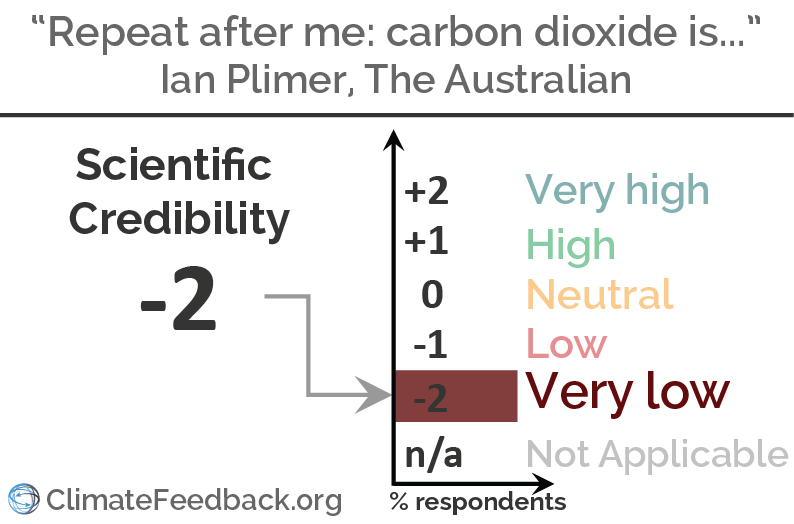
Find more details in the annotations below and in Climate Feedback's analysis
Hurricanes Are Moving Slower—And That's a Huge Problem
Overall scientific credibility: 'very high', according to scientists who analyzed this article.
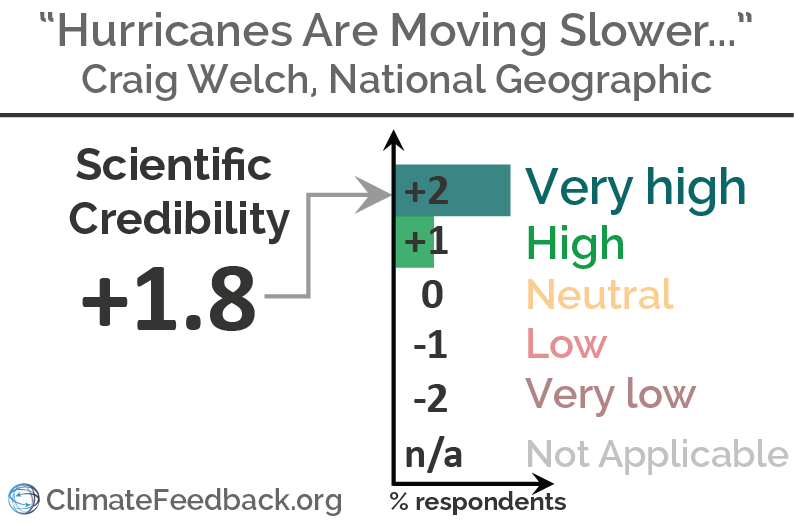
Find more details in the annotations below and in Climate Feedback's analysis
In a Warming West, theRio Grande Is Drying Up
Overall scientific credibility: 'high', according to scientists who analyzed this article.
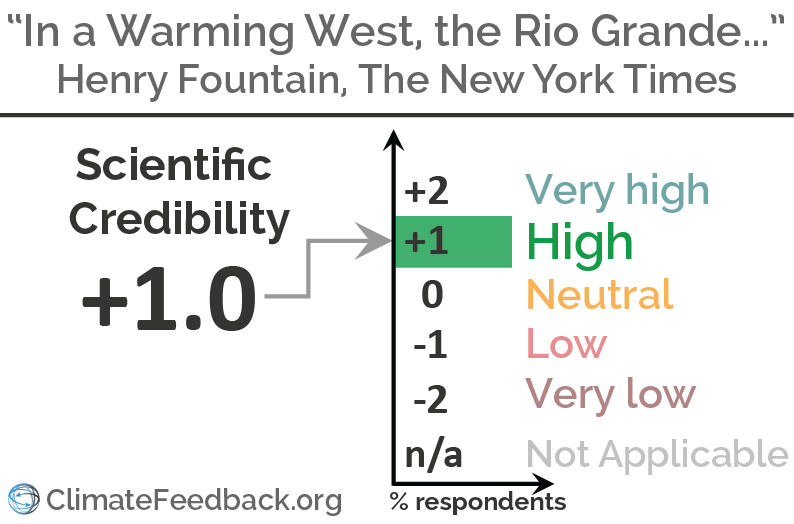
Find more details in the annotations below and in Climate Feedback's analysis
The Sea Is Rising, but Not Because of Climate Change
Overall scientific credibility: 'very low', according to scientists who analyzed this article.
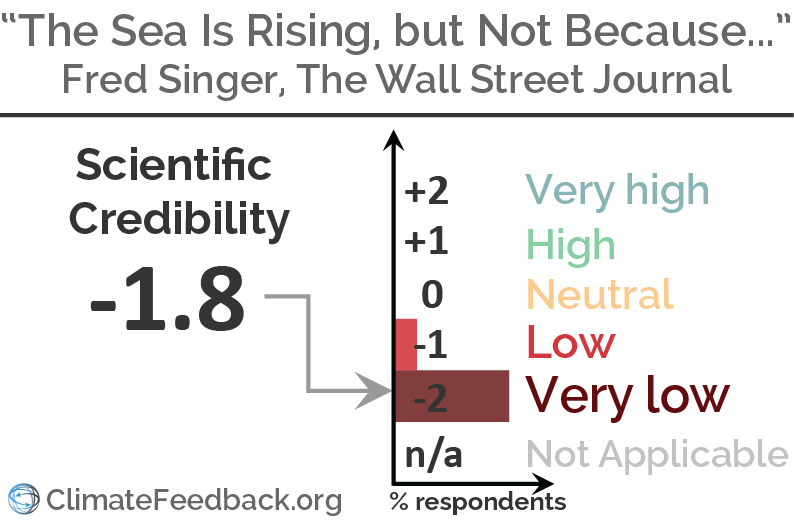
Find more details in the annotations below and in Climate Feedback's analysis
A Startling New Discovery Could Destroy All Those Global Warming Doomsday Forecasts
Overall scientific credibility: 'very low', according to scientists who analyzed this article.
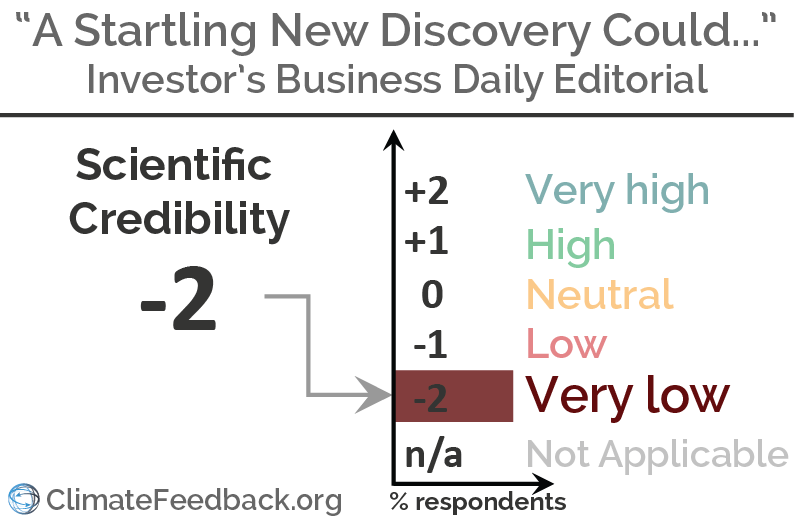
Find more details in the annotations below and in Climate Feedback's analysis
Satellite observations show sea levels rising, and climate change is accelerating it
Overall scientific credibility: 'very high', according to scientists who analyzed this article.
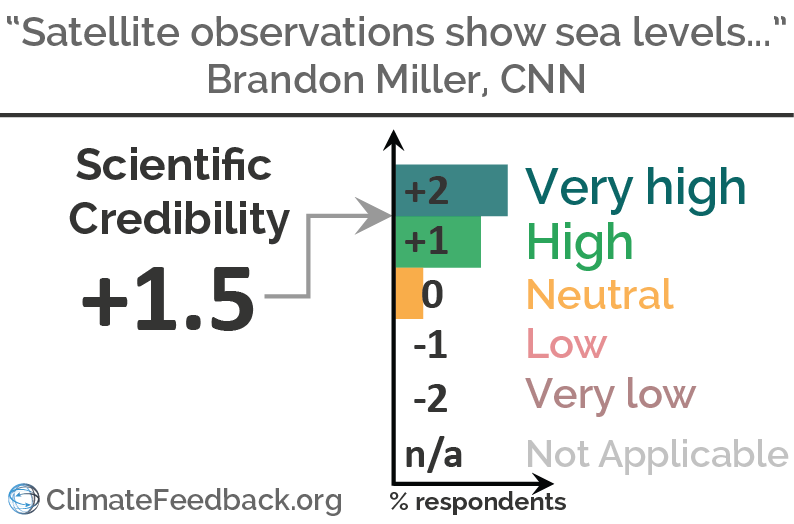
Find more details in the annotations below and in Climate Feedback's analysis
Arctic’s Winter Sea Ice Drops to Its Lowest Recorded Level
Overall scientific credibility: 'high', according to scientists who analyzed this article.
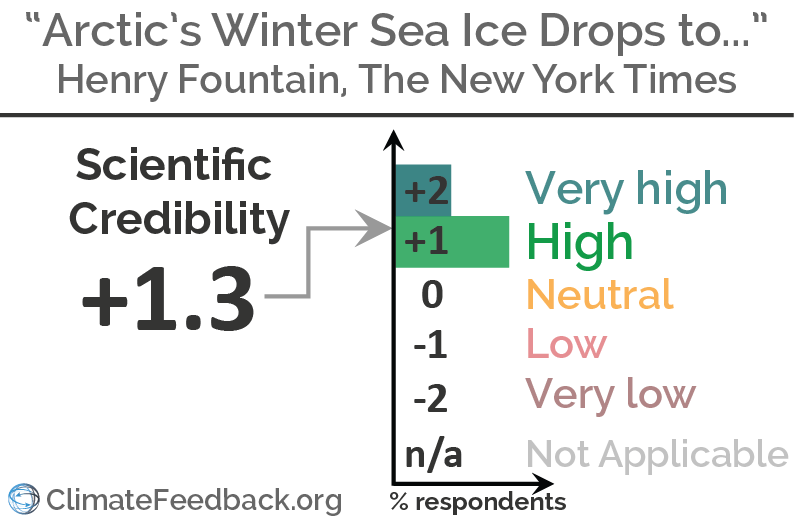
Find more details in the annotations below and in Climate Feedback's analysis
Earth Sets a Temperature Record for the Third Straight Year
Overall scientific credibility: 'very high', according to scientists who analyzed this article.
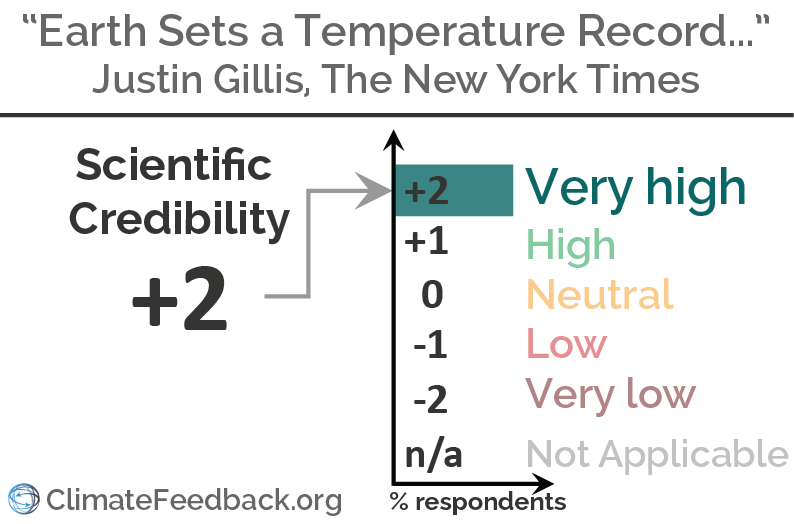
Find more details in the annotations below and in Climate Feedback's analysis
Jerry Brown Blames Climate Change for California Fires: ‘The New Normal’
Overall scientific credibility: 'very low', according to scientists who analyzed this article.
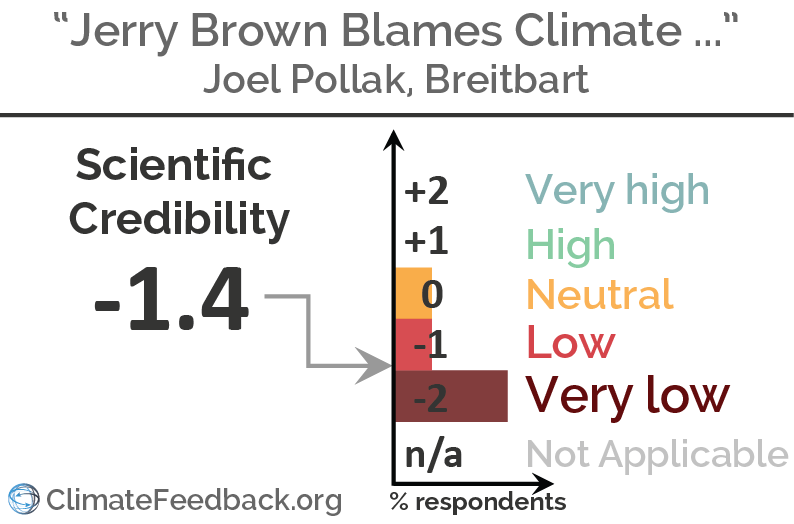
Find more details in Climate Feedback's analysis
It’s a real event, and it’s violence.
it is important to her and the greater commmunity
The history of painting is full of graphic violence and narratives that don’t necessarily belong to the artists own life
she means it doesnt matter ab race it matters ab what is being conveyed through the art
Ice Apocalypse
Overall scientific credibility: 'high', according to scientists who analyzed this article.
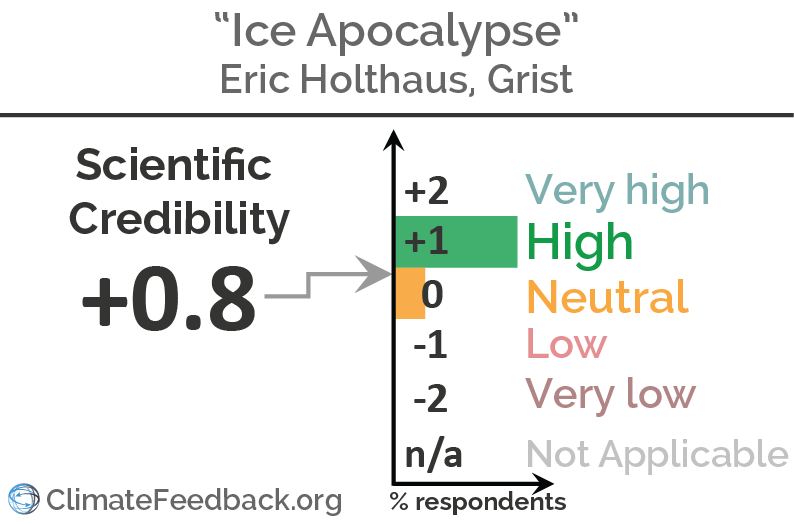
Find more details in the annotations below and in Climate Feedback's analysis
Climate change might be worse than thought after scientists find major mistake in water temperature readings
Overall scientific credibility: 'low', according to scientists who analyzed this article.
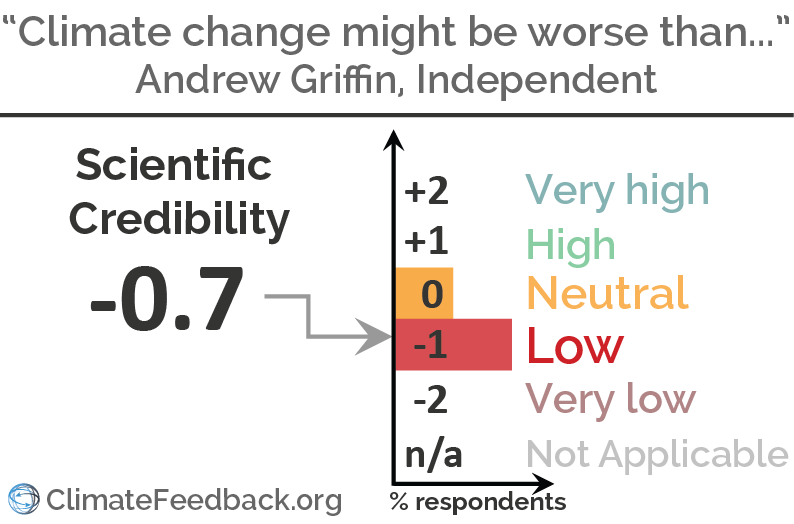
Find more details in the annotations below and in Climate Feedback's analysis
Misguided renewable energy policies will ruin nation
Overall scientific credibility: 'very low', according to scientists who analyzed this article.
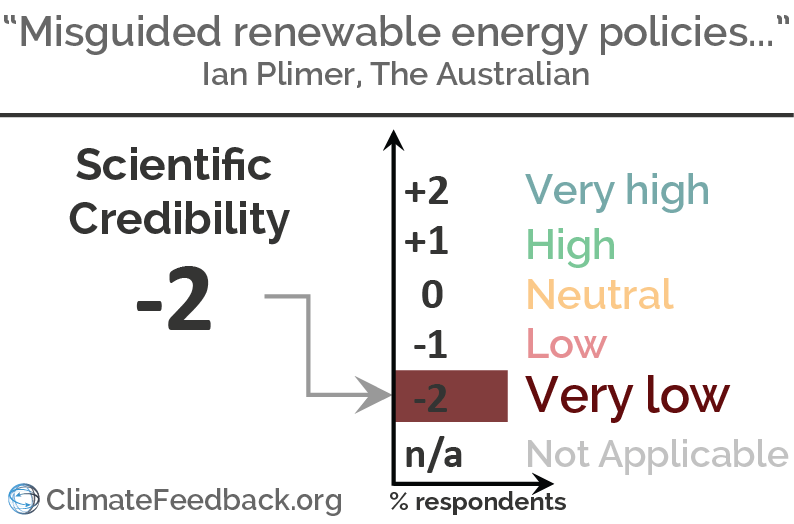
Find more details in the annotations below and in Climate Feedback's analysis
Has Climate Change Intensified 2017’s Western Wildfires?
Overall scientific credibility: 'very high', according to scientists who analyzed this article.
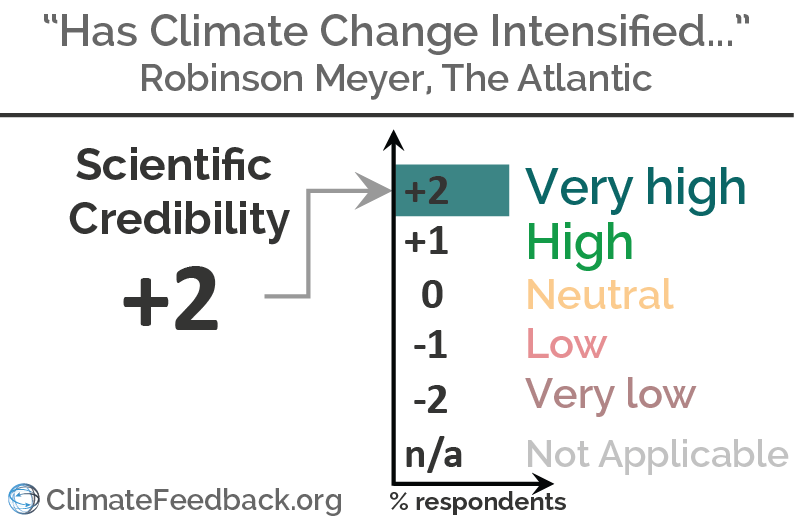
Find more details in the annotations below and in Climate Feedback's analysis
Alaska’s PermafrostIs Thawing
Overall scientific credibility: 'high' to 'very high', according to scientists who analyzed this article.
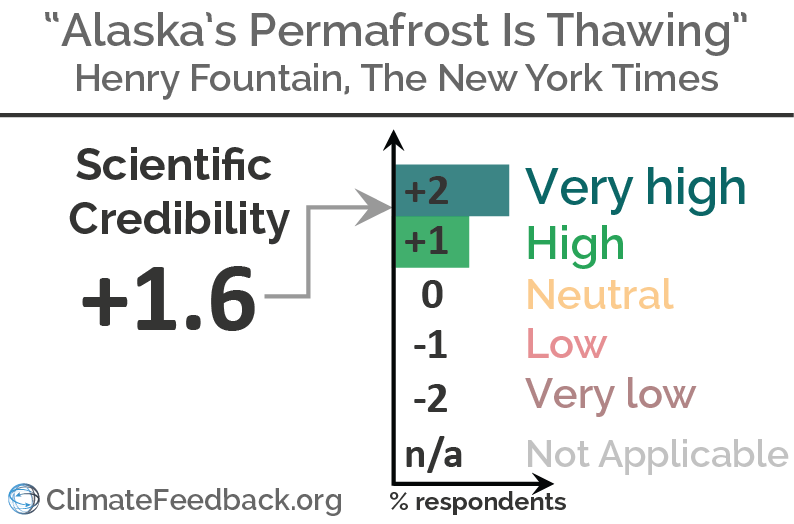
Find more details in the annotations below and in Climate Feedback's analysis
In Collaborative Reasoning discussions, students are engaged with texts through reasoning and deliberation with one another about the multi-faceted issues raised in the text(s). The discussion is a process of teasing out and working through "big" issues; handling of ambiguity and opposing viewpoints; reasoning, exploring, evaluation and building of arguments; and holding one's own or letting go within a social context.
Collaborative Reasoning
DELINGPOLE: ‘Global Warming’ Is a Myth, Say 58 Scientific Papers in 2017
Overall scientific credibility: 'very low', according to scientists who analyzed this article.
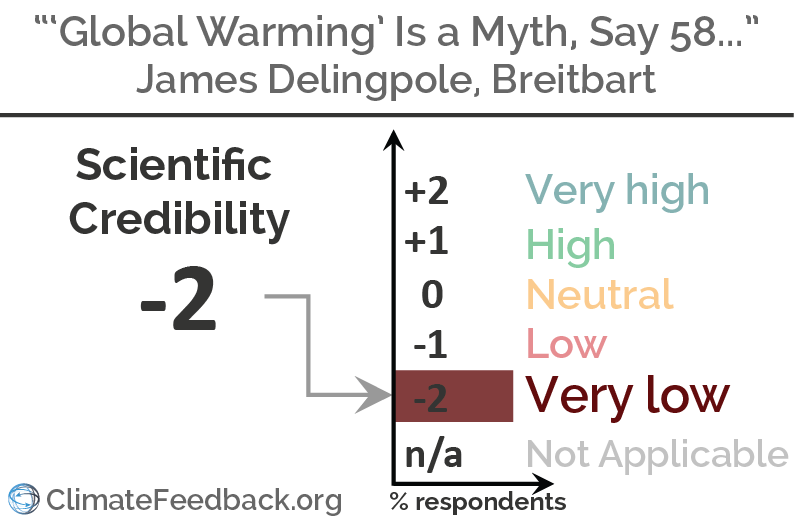
Find more details in the annotations below and in Climate Feedback's analysis
WHO: United States Among Least Polluting Nations on the Planet
Overall scientific credibility: 'very low', according to scientists who analyzed this article.
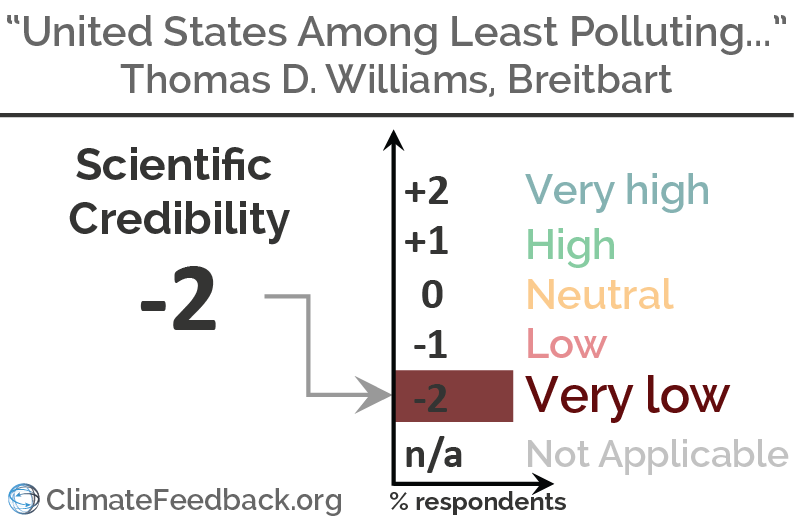
Find more details in the annotations below and in Climate Feedback's analysis
Historically, increases in atmospheric CO2 followed increases intemperature, they did not precede them. Therefore, CO2 levels could nothave forced temperatures to rise.
Racing to Find Answers in the Ice
Overall scientific credibility: 'high' to 'very high', according to 9 scientists who analyzed this article.
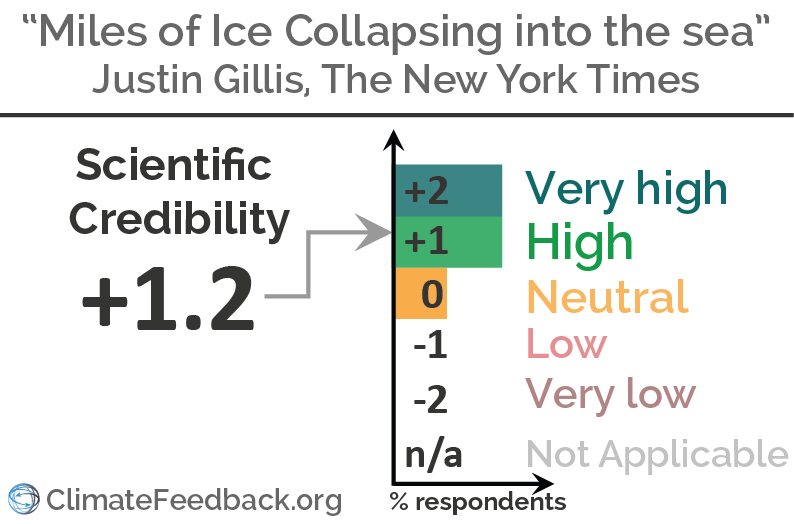
Find more details in the annotations below and in Climate Feedback's analysis
Global Quackery: Earth Has Not Warmed For Past 19 Years, New Study Finds
Overall scientific credibility: 'very low', according to scientists who analyzed this article.
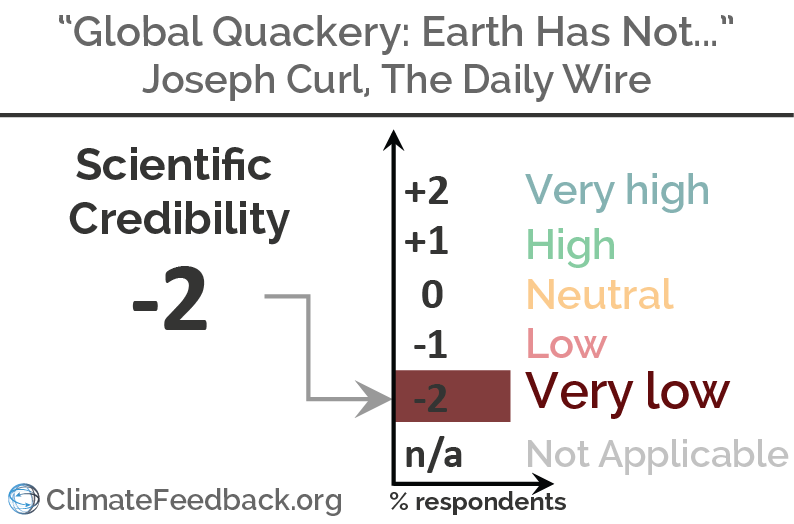
Find more details in the annotations below and in Climate Feedback's analysis
Another Arctic ice panic over as world temperatures plummet
Overall scientific credibility: 'very low', according to 7 scientists who analyzed this article.
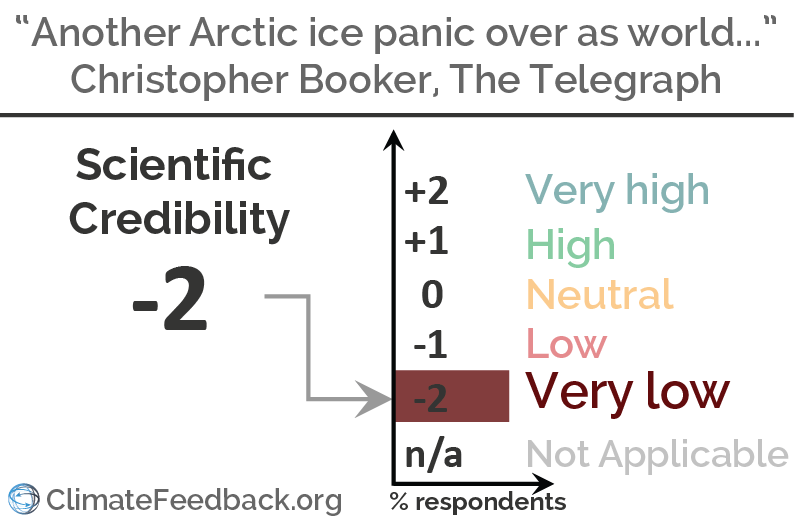
Find more details in the annotations below and in Climate Feedback's analysis
From extreme drought to record rain: Why California's drought-to-deluge cycle is getting worse
Overall scientific credibility: 'high', according to 4 scientists who analyzed this article.
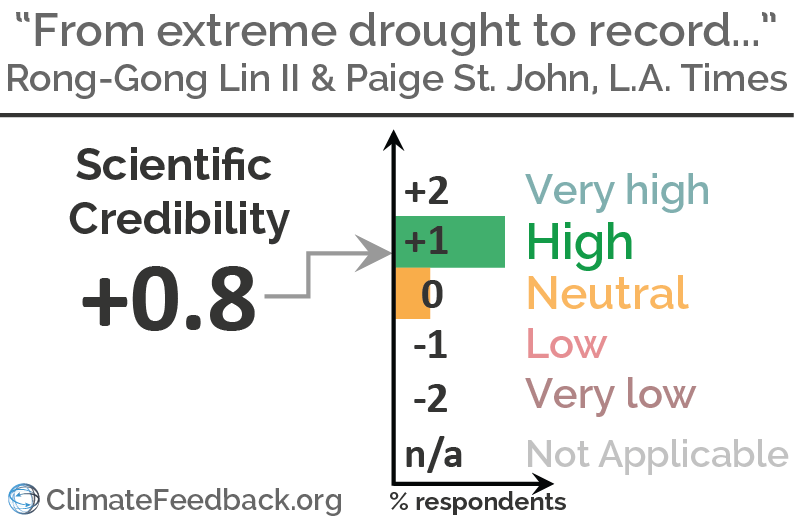
Find more details in the annotations below and in Climate Feedback's analysis
Why are climate-change models so flawed? Because climate science is so incomplete
Overall scientific credibility: 'very low', according to 9 scientists who analyzed this article.
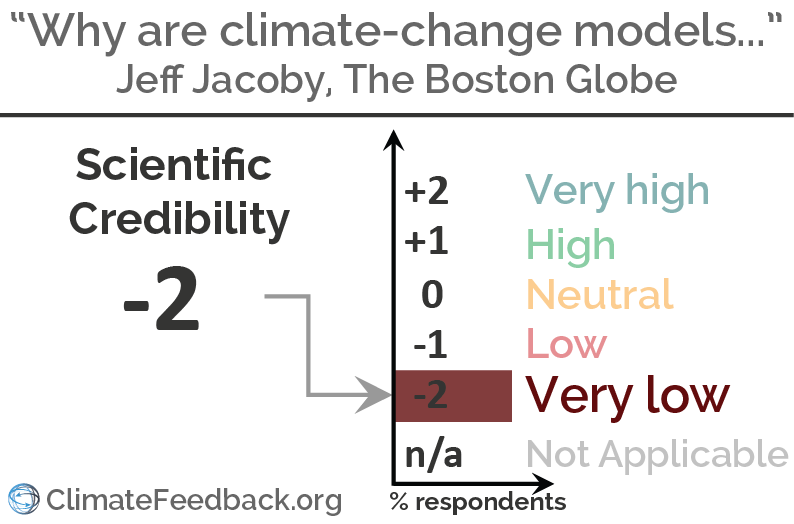
Find more details in the annotations below and in Climate Feedback's analysis
Earth heading for 'mini ice age' within 15 years
Overall scientific credibility: 'low' to 'very low', according to the 6 scientists who analyzed this article.
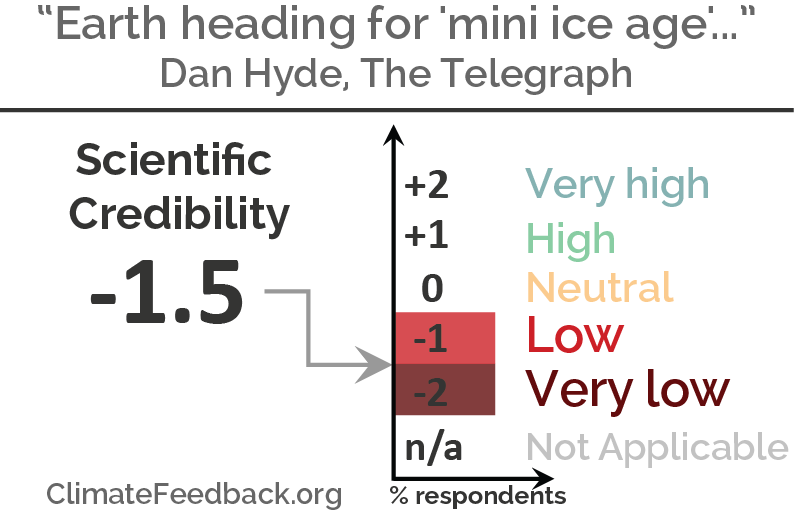
Find more details in the reply+annotations below and in Climate Feedback's analysis
Scientists: Here's What Really Causes Climate Change (And It Has Nothing To Do With Human Beings)
Overall scientific credibility: 'low' to 'very low', according to 4 scientists who analyzed this article.
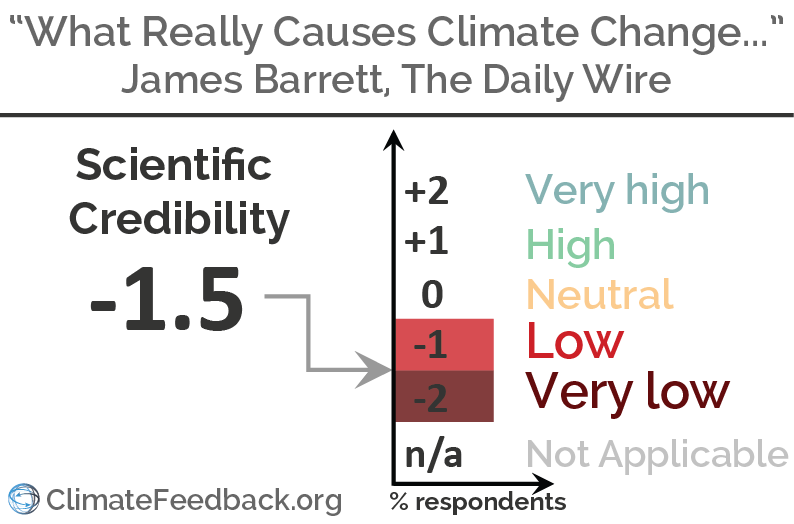
Find more details in the annotations below and in Climate Feedback's analysis
The Alarming Thing About Climate Alarmism
Overall scientific credibility: 'very low' to 'low', according to 7 climate scientists who evaluated this article.

Find more details in the annotations below and on ClimateFeedback.org
This evaluation features contributions by MIT Prof. Kerry Emanuel (see annotations below) and by Wesleyan University Prof. Gary Yohe (see his comments on the article)
karmour:
The article contains numerous scientific errors, does not provide references for some of its key claims, and ignores much of the published literature on the subjects discussed. It appears that many details have been cherry-picked or misconstrued in service of making a political point.
anonymous reviewer:
The author tries to rebut the narrative "that the world’s climate is changing from bad to worse". In doing so, he erects a straw-man, cherry-picks studies and misrepresents current climate science. Furthermore, the logic that since things are not 'worst-than-we-thought', we shouldn't take action and do the things we would do if things were simply 'bad', is lost on me…
emvincent:
The article is imprecise, for instance, about who the “doomsayers” and the “alarmists” are: since the core of the argumentation is about them, a definition of who they are and what they argue exactly cannot be avoided. It is also vague in its conclusion: “we need balance”, here again what exactly is meant by balance should be made clearer.
jgdwyer:
Tries and fails to make a convincing case for why humans need to worry about climate change less than they currently do.
bmv:
Although this author appears to have read parts of the IPCC report and carefully selected the facts which support his narrative, he presents information in a very misleading way, and some of his statements (e.g. "despite endless successions of climate summits, carbon emissions continue to rise") do not support his thesis that action on climate change is alarmist and unnecessary. His conclusion that "climate change is not worse than we thought. Some indicators are worse, but some are better" suggests a false equivalency between the indicators that are "worse" and those that are "better".
drchavas:
The author on multiple occasions presents blatantly inaccurate information and otherwise uses selective information to argue his point, which is highly misleading.
El Niño, explained: Why this year's could be one of the strongest on record
Overall scientific credibility: 'very high' to 'high', according to 5 scientists who analyzed this article.
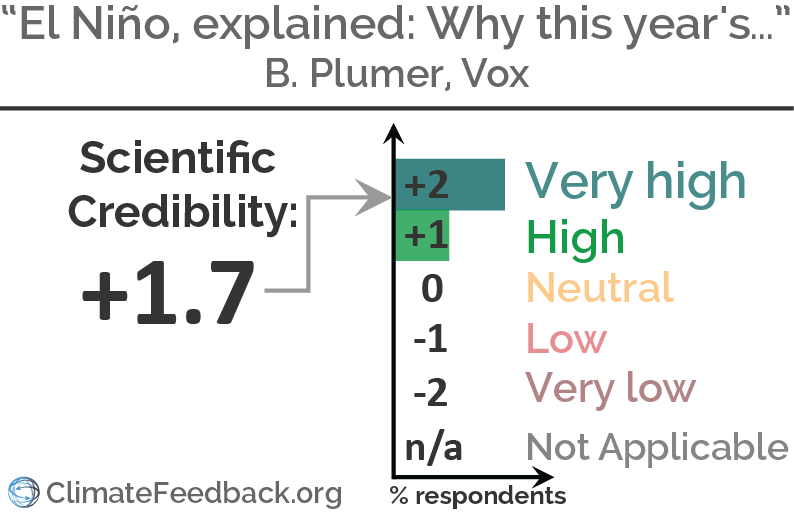
Find more details in the reply+annotations below and in Climate Feedback's analysis
fact
So Campbell seems to have a lot of "causal chains," so where are the "bundles of evidence" exactly? I mean, this definitely seems to be moral reasoning, but this looks like more of a chain than a bundle.
Spirit, which here comprises only the Supreme Being and the human soul, is surely as much included under the notion of natural object as body is, and is know-able to the philosopher purely in the same way, by observation and experience.
The soul is as much part of nature as the body is, and thus needs to be included taxonomically.
It is what differentiates humans from all other living things, and how God "made us in His image". A soul creating souls. This is also why humans are the only known thing to routinely be persuaded by moral reasoning.
and by the justness of the reasoning the passion may be more deeply rooted and enforced; and that thus both may be made to conspire in effectuating that persuasion which is the end proposed
I appreciate that Campbell values the relationship between logic and passion and that both are necessary to ensure that rhetoric is successful. Again, he contrasts previous thinkers, such as the Stoics, who disregarded the importance of passion, and only viewed "passions" as a hindrance to human happiness.
Providence seems plainly lo have pointed out this useful purpose lo which the pleasures of taste may be applied, by interposing them in a middle station between the pleasures of sense and those of pure intellect.
According to Blair, taste is a nice mixture between emotions/feelings and reason. He also recognizes that both are important for an individual to achieve satisfaction.
U.S. scientists officially declare 2016 the hottest year on record. That makes three in a row. The inside track on Washington politics. Be the first to know about new stories from PowerPost. Sign up to follow, and we’ll e-mail you free updates as they’re published. You’ll receive free e-mail news updates each time a new story is published. You’re all set! Sign up *Invalid email address Got it Got it
Overall scientific credibility: 'very high', according to 12 scientists who analyzed this article.
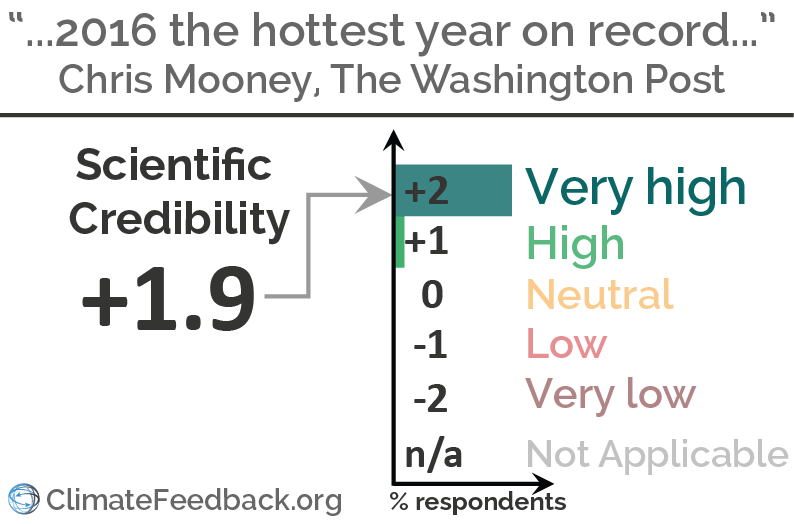
Find more details in the annotations below and in Climate Feedback's analysis
Australia’s Great Barrier Reef has worst coral die-off ever
Overall scientific credibility: 'high' to 'very high', according to 5 scientists who analyzed this article.
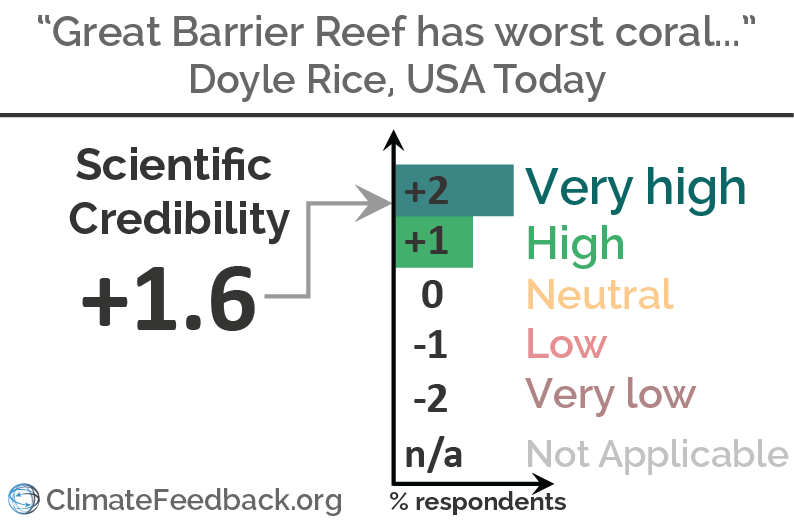
Find more details in the annotations below and in Climate Feedback's analysis
Stunning new data indicates El Nino drove record highs in global temperatures suggesting rise may not be down to man-made emissions
Overall scientific credibility: 'very low', according to 7 scientists who analyzed this article.
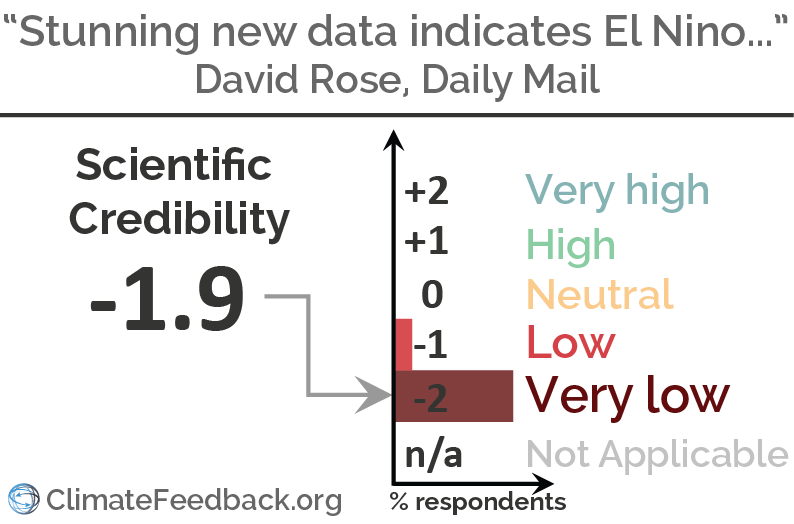
Find more details in the annotations below and in Climate Feedback's analysis
The Phony War Against CO2
Overall scientific credibility: 'very low', according to 6 scientists who analyzed this article.
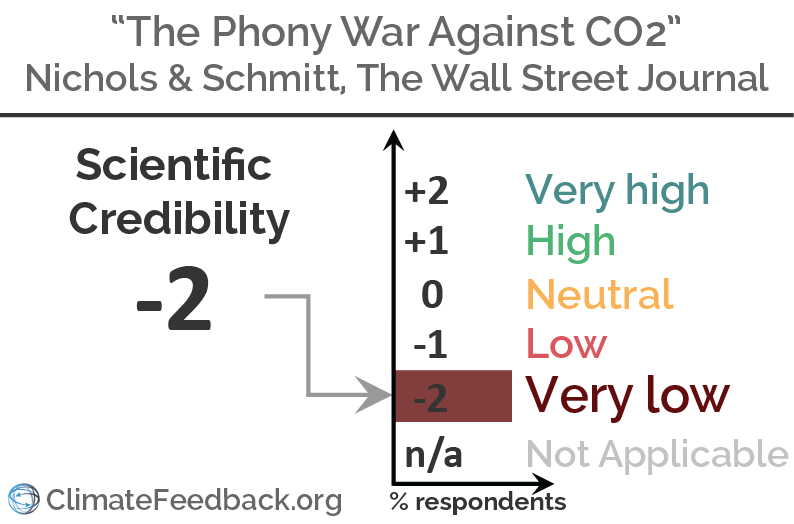
Find more details in the annotations below and in Climate Feedback's analysis
About Those Non-Disappearing Pacific Islands
Overall scientific credibility: 'low', according to 12 scientists who analyzed this article.
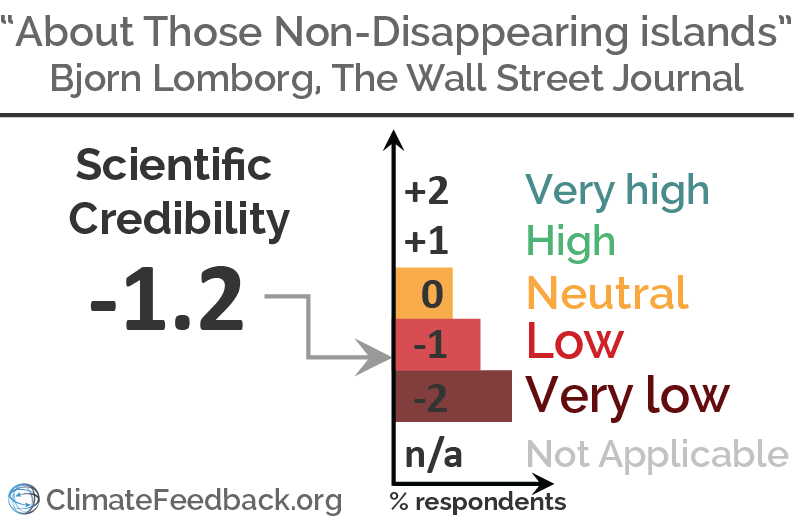
Find more details in the annotations below and in Climate Feedback's analysis
James Lovelock: ‘Before the end of this century, robots will have taken over’
Overall scientific credibility: 'low' to 'very low', according to 5 scientists who analyzed this article.
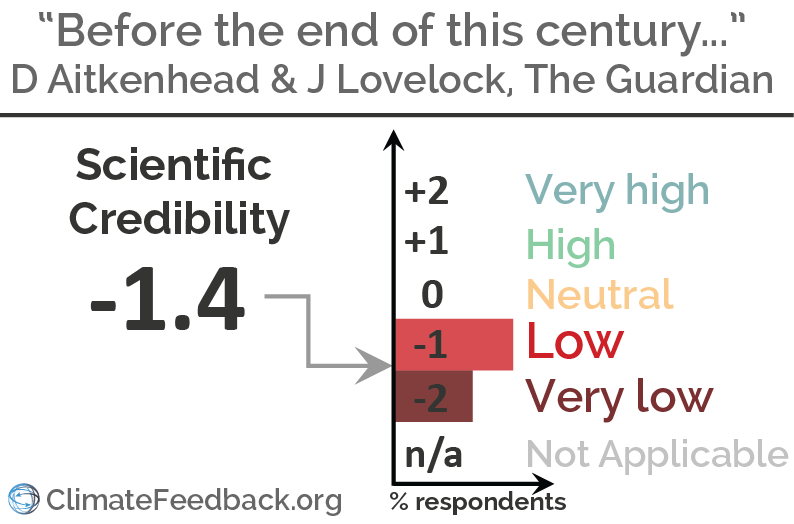
Find more details in the annotations below and in Climate Feedback's analysis
Greenland's huge annual ice loss is even worse than thought
Overall scientific credibility: 'very high', according to 7 scientists who analyzed this article.
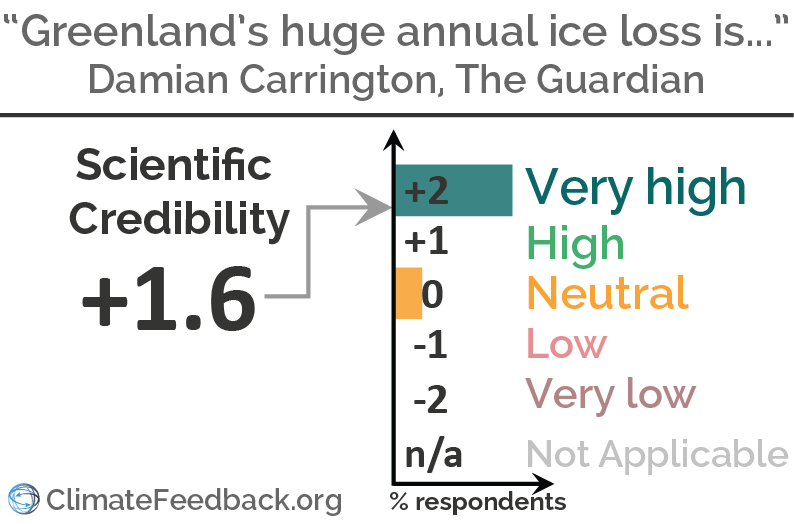
Find more details in the annotations below and in Climate Feedback's analysis
It is an outdated burden on the Cuban people. It's a burden on the Americans who want to work and do business or invest here in Cuba. It's time to lift the embargo.
This a use of "Begging the Question", or circular reasoning because it asserts that [the embargo] is a burden on the Cuban people, and goes on to invoke that it likewise impedes Americans. But is the embargo actually burdensome to either populations? It is not addressed.
Flooding of Coast,Caused by Global Warming,Has Already Begun
Overall scientific credibility: 'very high', according to 12 scientists who analyzed this article.
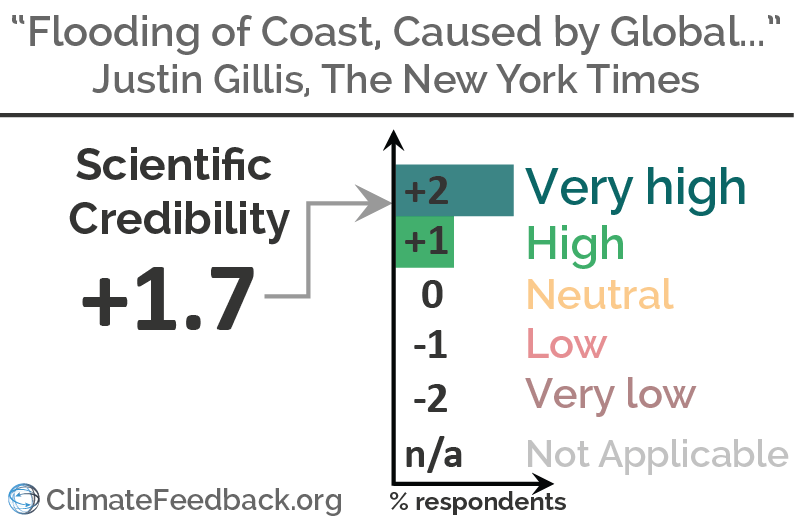
Find more details in the annotations below and in Climate Feedback's analysis
Disasters like Louisiana floods will worsen as planet warms, scientists warn
Overall scientific credibility: 'high', according to the 7 scientists who analyzed this article.
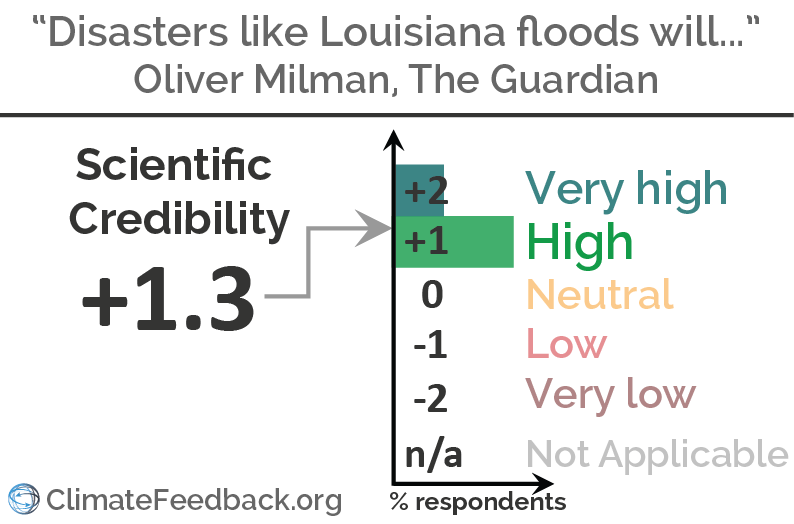
Find more details in the annotations below and in Climate Feedback's analysis
What science can tell us about the links between global warming and massive heat waves The inside track on Washington politics. Be the first to know about new stories from PowerPost. Sign up to follow, and we’ll e-mail you free updates as they’re published. You’ll receive free e-mail news updates each time a new story is published. You’re all set! Sign up *Invalid email address Got it Got it
Overall scientific credibility: 'very high' to 'high', according to the 10 scientists who analyzed this article.
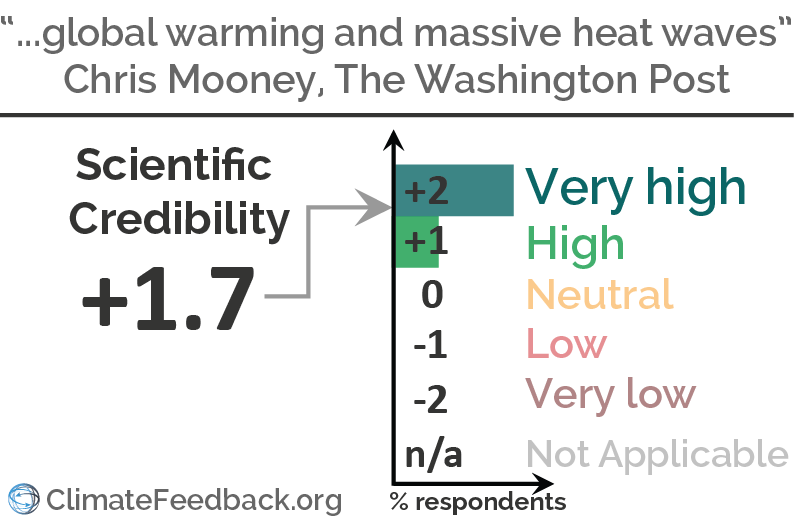
Find more details in the annotations below and in Climate Feedback's analysis
Thanks to climate change, the Arctic is turning green The inside track on Washington politics. Be the first to know about new stories from PowerPost. Sign up to follow, and we’ll e-mail you free updates as they’re published. You’ll receive free e-mail news updates each time a new story is published. You’re all set! Sign up *Invalid email address Got it Got it
Overall scientific credibility: 'neutral' to 'high', according to the 8 scientists who analyzed this article.
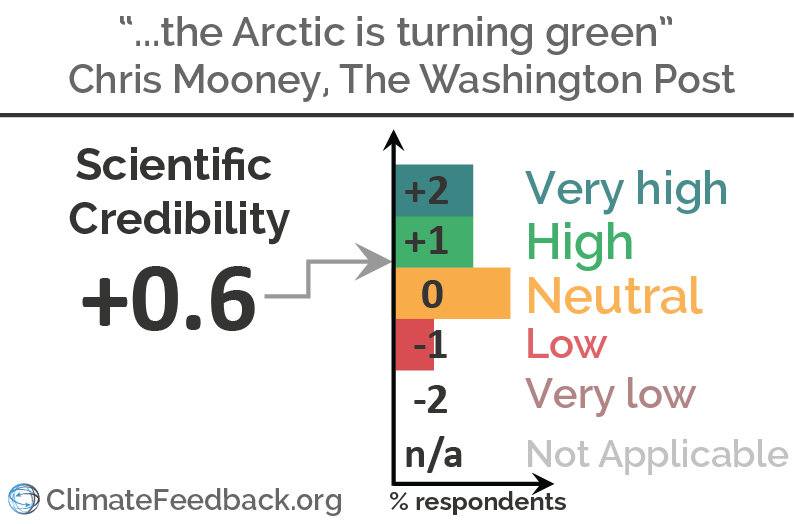
Find more details in the annotations below and in Climate Feedback's analysis
No one ever says it, but in many ways global warming will be a good thing
Overall scientific credibility: 'low' to 'very low', according to 14 scientists who analyzed this article.
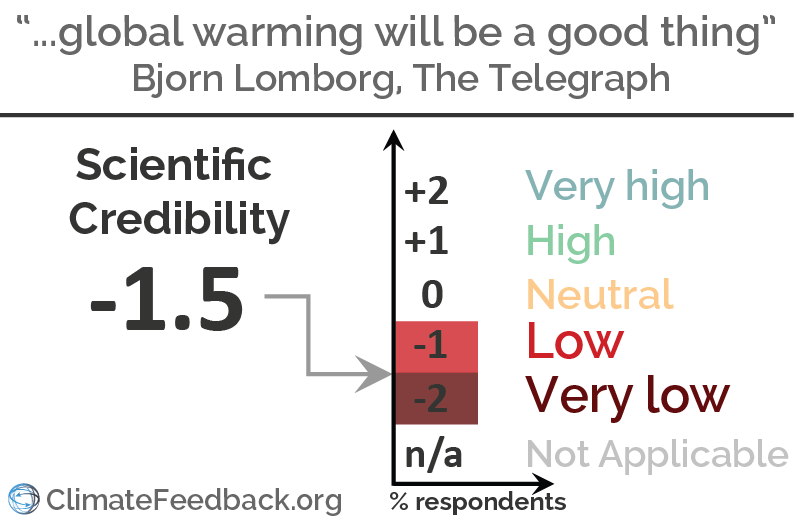
Find more details in the annotations below and in Climate Feedback's analysis
What we’re doing to the Earth has no parallel in 66 million years, scientists say The inside track on Washington politics. Be the first to know about new stories from PowerPost. Sign up to follow, and we’ll e-mail you free updates as they’re published. You’ll receive free e-mail news updates each time a new story is published. You’re all set! Sign up *Invalid email address Got it Got it .hideText{position:absolute;left:-10000px}
Overall scientific credibility: 'very high' to 'high', according to 7 scientists who analyzed this article.
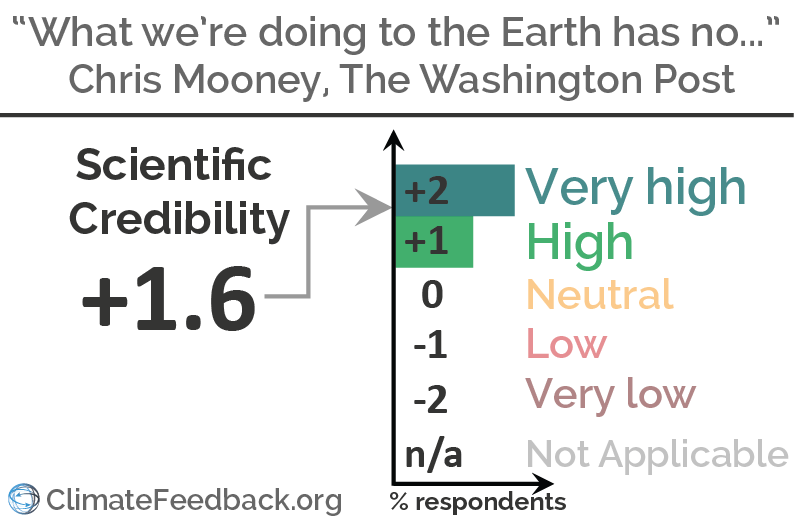
Find more details in the reply+annotations below and in Climate Feedback's analysis
Seas Are Rising at Fastest Rate in Last 28 Centuries
Overall scientific credibility: 'very high' to 'high', according to 7 scientists who analyzed this article.
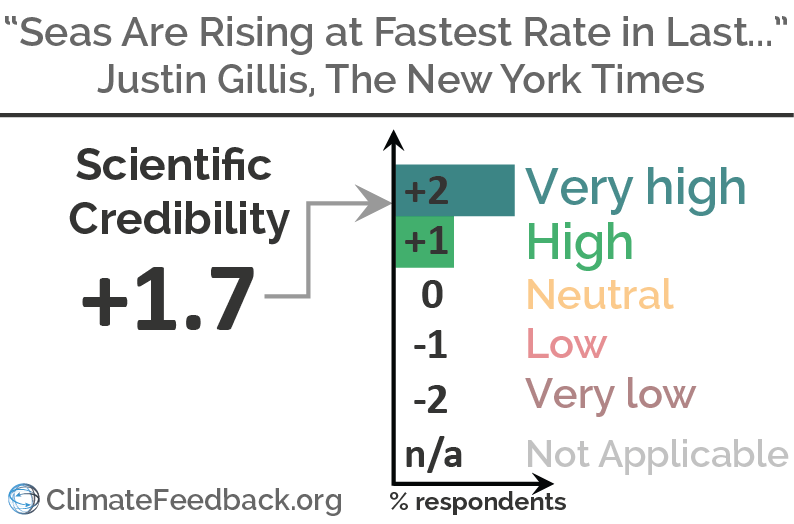
Find more details in the reply+annotations below and in Climate Feedback's analysis
The Climate Snow Job
Overall scientific credibility: 'very low' to 'low', according to 10 scientists who analyzed this article.
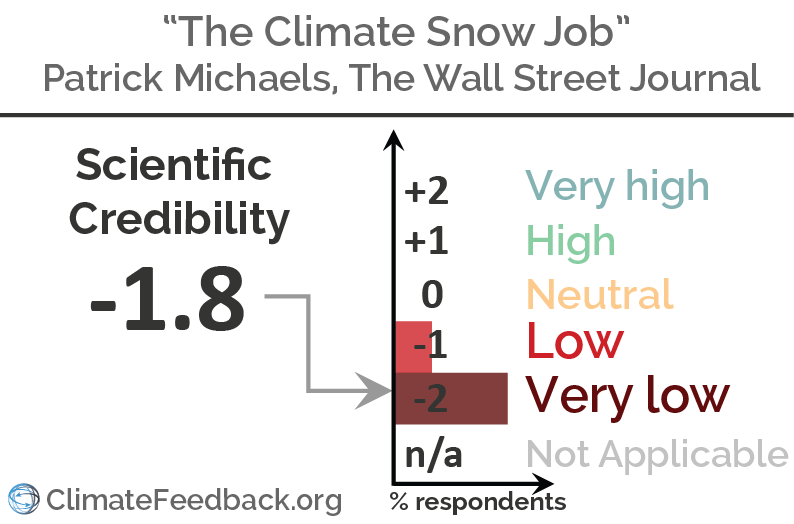
Find more details in the reply+annotations below and in Climate Feedback's analysis
2015 Was Hottest Year in Historical Record, Scientists Say
Overall scientific credibility: 'very high', according to 8 scientists who analyzed this article.
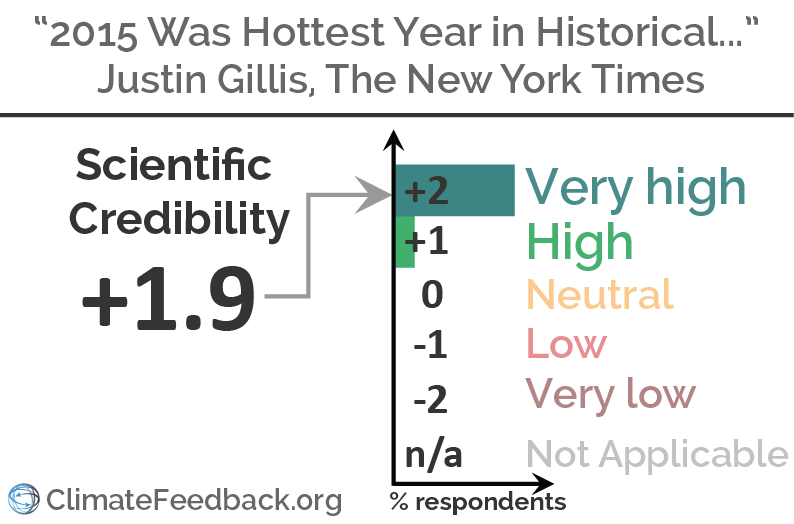
Find more details in the reply+annotations below and in Climate Feedback's analysis
2015 Was Not Even Close To Hottest Year On Record
Overall scientific credibility: 'very low', according to 10 scientists who analyzed this article.
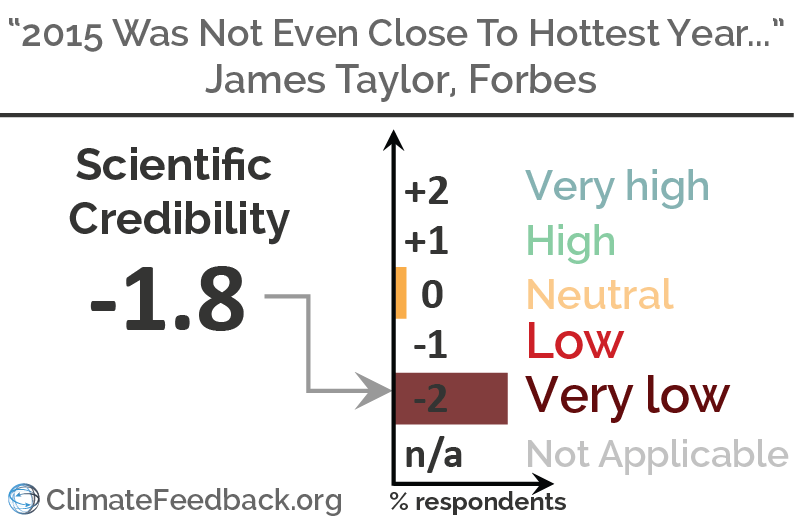
Find more details in the reply+annotations below and in Climate Feedback's analysis
Scientists say human greenhouse gas emissions have canceled the next ice age
Overall scientific credibility: 'very high', according to 8 scientists who analyzed this article.
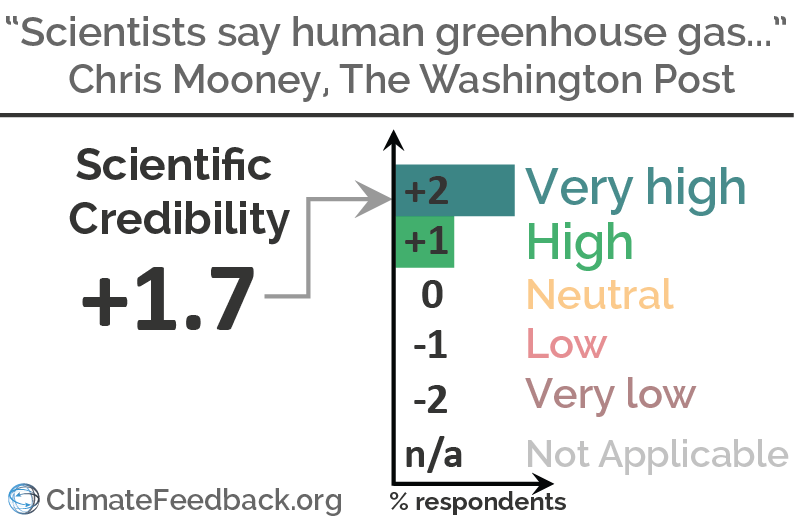
Find more details in the reply+annotations below and in Climate Feedback's analysis
Your Complete Guide to the Climate Debate
Overall scientific credibility: 'very low' to 'low', according to 12 scientists who analyzed this article.
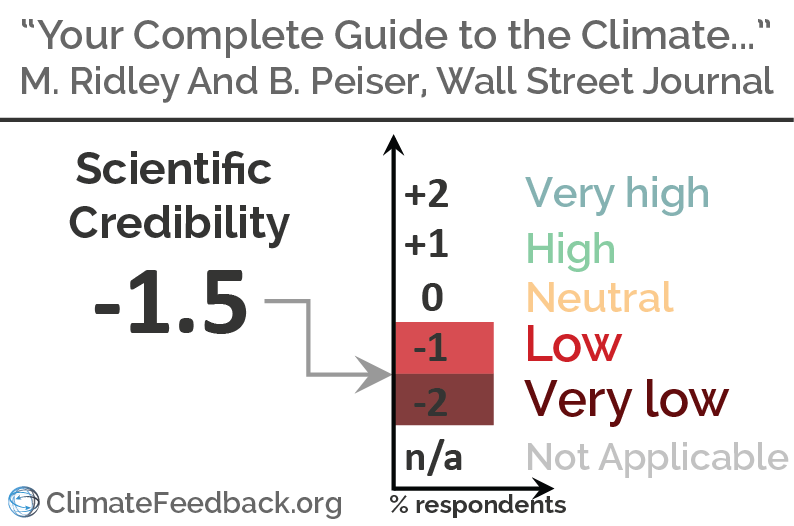
Find more details in the reply+annotations below and in Climate Feedback's analysis
Updated NASA Data: Global Warming Not Causing Any Polar Ice Retreat
Overall scientific credibility: 'very low', according to 9 scientists who analyzed this article.
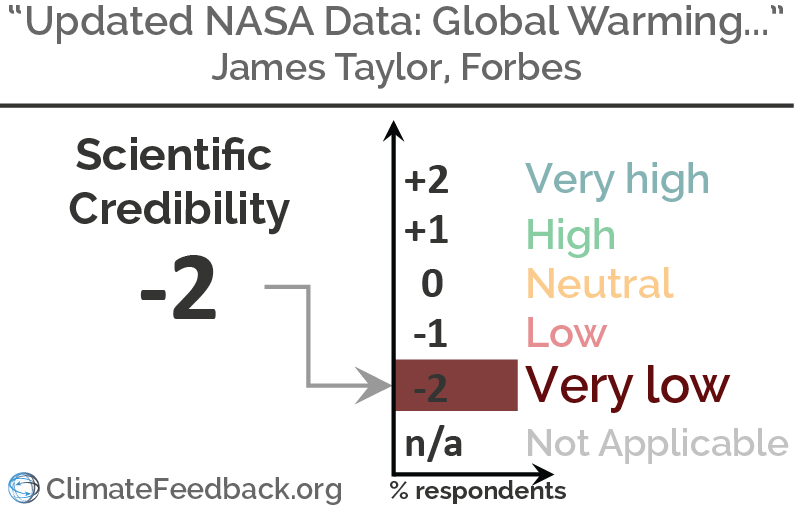
Find more details in the reply+annotations below and in Climate Feedback's analysis
Top 10 Global Warming Lies That May Shock You
Overall scientific credibility: 'very low', according to 12 scientists who analyzed this article.
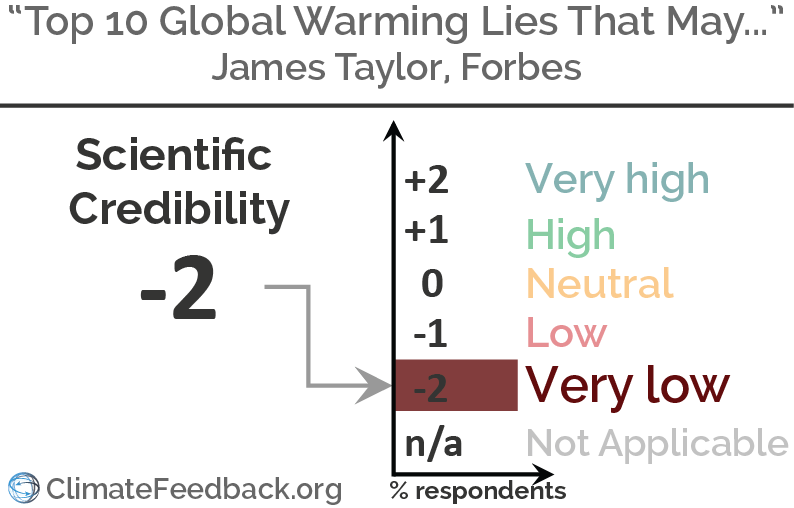
Find more details in the reply+annotations below and in Climate Feedback's analysis
Climate Change Will Cause Increased Flooding In Coastal Cities
Overall scientific credibility: 'high', according to 6 scientists who analyzed this article.
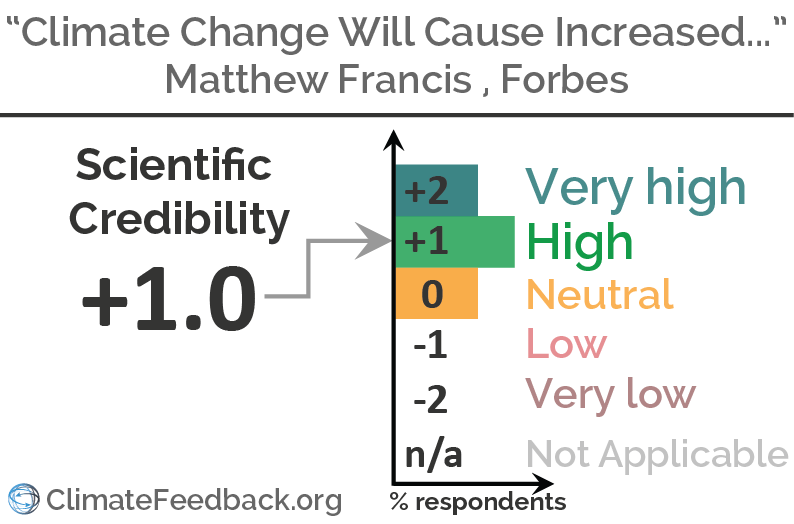
Find more details in the reply+annotations below and in Climate Feedback's analysis
The vested interests at play mean the evidence we see from the research community isn’t always objective. So instead of allowing “experts” to determine the best course of action, why not ask the public? We could demand independent, objective evidence
Underplays the vast independent scientific research literature that is already out there.
Wake up, Obama, climate change has been happening forever
Overall scientific credibility: 'very low', according to 9 scientists who analyzed this article.
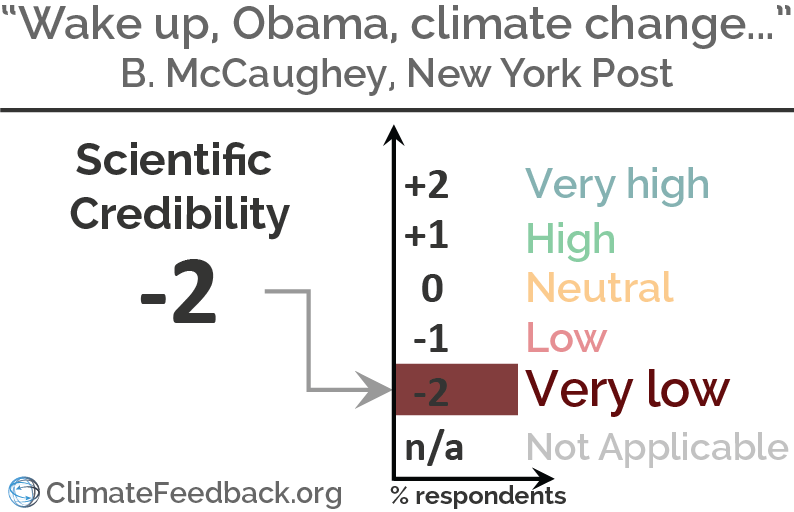
Find more details in the reply+annotations below and in Climate Feedback's analysis
Deceptive temperature record claims
Overall scientific credibility: 'very low', according to 7 scientists who analyzed this article.
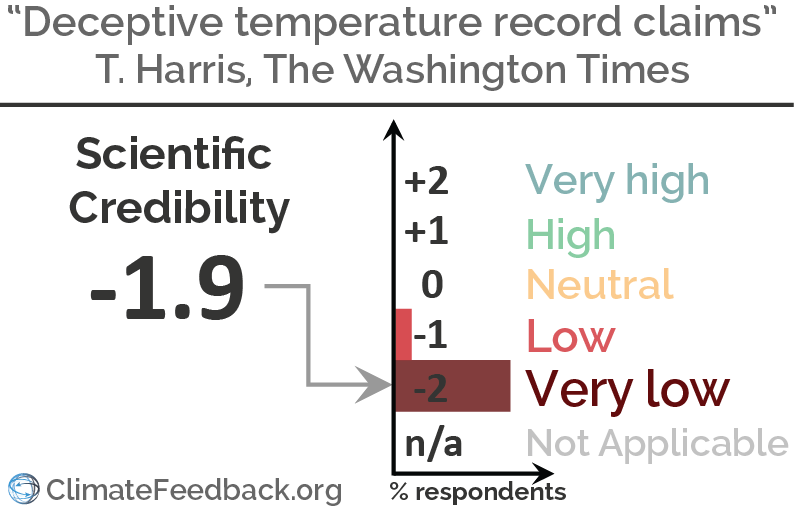
Find more details in the reply+annotations below and in Climate Feedback's analysis
How Arctic ice has made fools of all those poor warmists
Overall scientific credibility: 'very low', according to the 8 scientists who analyzed this article.
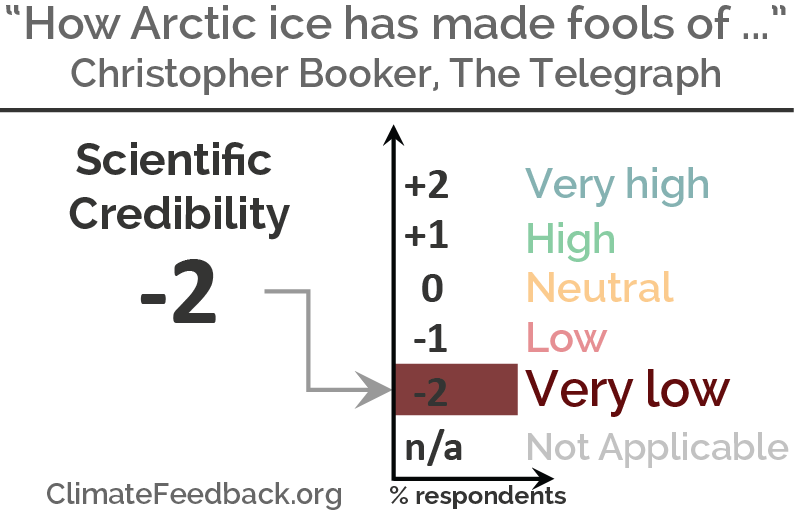
Find more details in the reply+annotations below and in Climate Feedback's analysis
ENCYCLICAL LETTER LAUDATO SI’
Overall scientific credibility: 'high', according to the 9 climate scientists who analyzed this article.

Find more details in the reply+annotations below and in ClimateFeedback's analysis
FTT, as it applies to reasoning, is adapted from dual process models of human cognition. It differs from the traditional dual process model in that it makes a distinction between impulsivity and intuition—which are combined in System 1 according to traditional dual process theories—and then makes the claim that expertise and advanced cognition relies on intuition.[57] The distinction between intuition and analysis depends on what kind of representation is used to process information. The mental representations described by FTT are categorized as either gist or verbatim representations: Gist representations are bottom-line understandings of the meaning of information or experience, and are used in intuitive gist processing. Verbatim representations are the precise and detailed representations of the exact information or experience, and are used in analytic verbatim processing.
2014 Breaks Heat Record
Overall scientific credibility: 'high' to 'very high', according to 8 climate scientists who evaluated this article.

Find more details in the annotations below and here
jgdwyer:
This article accurately describes global warming and puts the news that 2014 is the hottest year on record into appropriate context. The article does a very good job of distinguishing between climate variability and climate change with helpful discussion on ENSO and the relatively cold temperatures in the Eastern United States (while staying within the bounds of the mainstream climate science understanding).
karmour:
Very good article overall. I do wish the author had fact checked the incorrect claim by Dr. Christy (that global temperatures have not changed since the end of the 20th century) prior to including his quote in the article.
aklocker:
Scientifically this article seems to be correct but it could be a bit more precise in some of its statements. One thing I like is that it mentions different opinions on some points where scientists do not agree rather than giving a biased story.
bmv:
This article does a good job of putting the 2014 temperature record in context with quotes from experts and good descriptions of relevant issues such as El Nino. References to "skeptics" were appropriately followed up by evidence of their misinterpretation/mischaracterization of the data.
aalpert:
This article provides an accurate and well supported evaluation of the finding that 2014 was the hottest year on record.
emvincent:
Overall, this article is fair in its representation of the 2014 temperature record event and in reminding the context of the long-term warming trend+natural climate variability.
alexis.tantet:
The quality of this article is overall higher than most newspaper articles on climate change as it avoids the usual pitfalls such as confusing year to year variability with long-term change. It also addresses issues prone to confusion, such as why eastern USA did not experience such a warm year as most of the globe, which can help the readers to put the science in perspective with the seasonal climate they have actually experienced. The fact that the article focuses mostly on the observational record and not on theoretical or modeling studies may be a weakness, but the scope of an article cannot be too broad.
Sobel, D. M. & Kirkham, N.Z. (2012). The influence of social information on children’s statistical and causal inferences. In F.Xu (Ed.). Rational constructivism in cognitive development.
Sobel, D. M., & Kirkham, N. Z. (2006). Blickets and babies: The development of causal reasoning in toddlers and infants. Developmental Psychology, 42, 1103-1115.
Sobel, D. M., & Kirkham, N. Z. (2007). Bayes nets and Babies: Infants’ developing representations of causal knowledge. Developmental Science, 10, 298-306.
Majority Reasoning: (Justice Blackmun) A. Rule: The State of Texas asserts it’s rule (a law banning all abortions) is furthered by 2 interests: (1) Protecting prenatal life and (2) the medical safety of woman. The court accepts these interests, but rejects Texas’s absolute rule because: 1. There are 2 counter-weighing interests of the woman: a. The woman has a privacy right grounded in a "penumbra" of Amendments 1, 4, 5, 9, 14, because "activities relating to marriage, procreation, family relationships, and child rearing and education" are "fundamental" and "implicit in the concept of ordered liberty." b. The woman also has an interest in avoiding possible severe physical and psychological harm if an abortion is denied. 2. Also, a fetus is not a "person" within the meaning of the constitution, so it doesn’t get protection as a person. 3. Therefore, a proper rule balances the interests of the state v. the interests of the woman: in the early stages of pregnancy, the woman has stronger interests than the state, but as a fetus becomes more advanced, the state interests in prenatal life and a woman’s health grow to be "compelling," thus overriding the woman’s interests. This results in a 3-part RULE (trimester framework) the court announces: a. first trimester of pregnancy: no/little state interest in regulating abortion, so most abortion regulations are invalid. b. second trimester: moderate state interest (medical health of woman) so most medical regulations are okay. c. third trimester: Compelling state interest (fetal viability) so can outlaw abortion except to save woman’s life. B. Application: Here (in this case) Texas’s law violates this framework, because it outlaws abortions not just in the third trimester, but also in the first and second trimesters of pregnancy.
Reasoning: This is the most important part of your brief as it describes why the court ruled the way it did; some law professors dwell on facts more than others, some more on procedural history, but all spend the most time on the court’s reasoning as it combines all parts of the case rolled in one, describing the application of the rule of law to the facts of the case, often citing other court’s opinions and reasoning or public policy considerations in order to answer the issue presented. This part of your brief traces the court’s reasoning step by step, so be sure that you record it without gaps in logic as well.
The testimony makes it manifest that he was a special police officer to some extent identified with the work of the prosecutor's office, and that position, upon well-settled grounds of public policy, required him to assist, at least, in the prosecution of offenders against the law. The services he rendered, in this instance, must be presumed to have been rendered in pursuance of that public duty, and for its performance he was not entitled to receive a special quid pro quo.
Court finds sufficient evidence to characterize this fellow as a public official.
His interaction with the prosecutor's office weighed in as a factor in suggesting he had a legal duty.
Since he is characterized within the rule as a public official, he cannot, as a matter of law, receive a reward for the performance of his duties.
Reasoning The reasoning gives the reader insight into how the court arrived at its decision. It is instructive in nature. Courts often back their holdings with several lines of reasoning, each of which should be summarized in this section. Unnecessary repetition of facts or the issue should be avoided. A court�s rationale for its holding might be a simple explanation of its thought process. Alternatively, the reasoning might be based on the plain language of the statute, Congressional intent, the re-enactment doctrine, or other common means of resolving judicial disputes.
Several lines of reasoning may be used to back the Court's holdings and may be:
Once you abandon entirely the crazy idea that the type of a value has anything whatsoever to do with the storage, it becomes much easier to reason about it. Of course, my point above stands: you don't need to reason about it unless you are writing unsafe code or doing some sort of heavy interoperating with unmanaged code. Let the compiler and the runtime manage the lifetime of your storage locations; that's what its good at.
Understanding what you should (and should not) reason about in the language you are using is an important part of good programming; and a language that lets you reason (nee worry) about only the things you need to worry about is an important part of a good programming language.